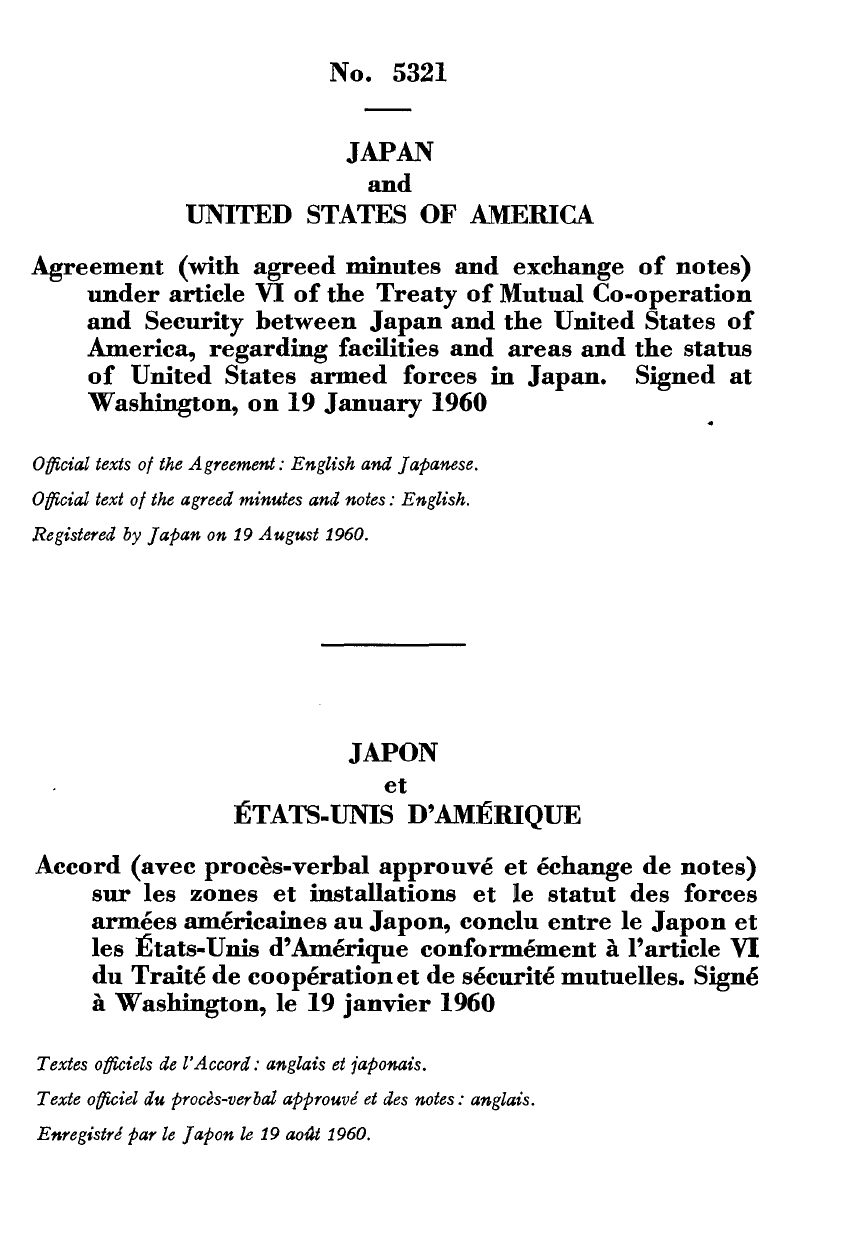
No.
5321
JAPAN
and
UNITED
STATES
OF
AMERICA
Agreement
(with
agreed
minutes
and
exchange
of
notes)
under
article
VI
of
the
Treaty
of
Mutual
Co-operation
and
Security
between
Japan
and
the
United
States
of
America,
regarding
facilities
and
areas
and
the
status
of
United
States
armed
forces
in
Japan.
Signed
at
Washington,
on
19
January
1960
«
Official
texts of
the
Agreement:
English
and
Japanese.
Official
text
of
the
agreed
minutes
and
notes
:
English.
Registered
by
Japan
on
19
August
1960.
JAPON
et
ÉTATS-UNIS
D'AMÉRIQUE
Accord
(avec
procès-verbal
approuvé
et
échange
de
notes)
sur
les
zones
et
installations
et
le
statut
des
forces
armées américaines
au
Japon,
conclu
entre
le
Japon
et
les
États-Unis
d'Amérique
conformément
à
l'article
VI
du
Traité
de
coopération
et
de
sécurité
mutuelles.
Signé
à
Washington,
le
19
janvier
1960
Textes
officiels
de
l'Accord:
anglais
et
japonais.
Texte
officiel
du
procès-verbal
approuvé
et
des
notes
:
anglais.
Enregistré
par
le
Japon
le
19
août
1960.
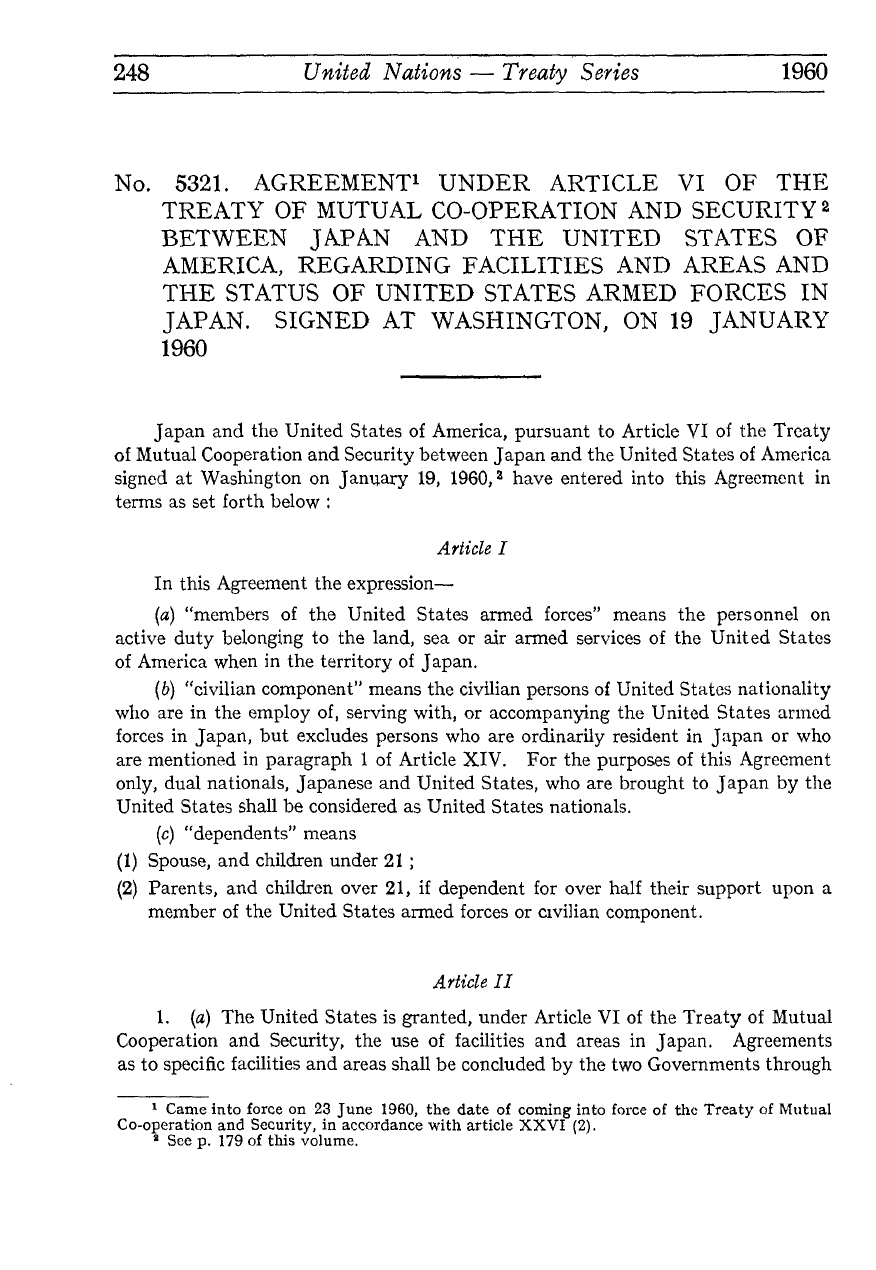
248
United
Nations
—
Treaty
Series
1960
No.
5321.
AGREEMENT
1
UNDER
ARTICLE
VI
OF
THE
TREATY
OF
MUTUAL
CO-OPERATION
AND
SECURITY
2
BETWEEN
JAPAN
AND
THE
UNITED
STATES
OF
AMERICA,
REGARDING
FACILITIES
AND
AREAS
AND
THE
STATUS
OF
UNITED
STATES ARMED
FORCES
IN
JAPAN.
SIGNED
AT
WASHINGTON,
ON
19
JANUARY
1960
Japan
and
the
United
States
of
America,
pursuant
to
Article
VI
of
the
Treaty
of
Mutual
Cooperation
and
Security
between
Japan
and
the
United
States
of
America
signed
at
Washington
on
January
19,
I960,
2
have
entered
into
this
Agreement
in
terms
as
set
forth
below
;
Article
I
In
this
Agreement
the
expression
(a)
"members
of
the
United
States
armed
forces"
means
the
personnel
on
active
duty
belonging
to
the
land,
sea
or
air
armed
services
of
the
United
States
of
America
when
in
the
territory
of
Japan.
(b)
"civilian component"
means
the
civilian
persons
of
United
States
nationality
who
are
in
the
employ
of,
serving
with,
or
accompanying
the
United
States
armed
forces
in
Japan,
but
excludes
persons
who
are
ordinarily
resident
in
Japan
or
who
are
mentioned
in
paragraph
1
of
Article
XIV.
For
the
purposes
of
this
Agreement
only,
dual
nationals,
Japanese
and
United
States,
who
are
brought
to
Japan
by
the
United
States
shall
be
considered
as
United
States
nationals.
(c)
"dependents"
means
(1)
Spouse,
and
children
under
21
;
(2)
Parents,
and
children
over
21,
if
dependent
for
over
half
their
support
upon
a
member
of
the
United
States
armed
forces
or civilian
component.
Article
II
1,
(a)
The
United
States
is
granted,
under
Article
VI
of
the
Treaty
of
Mutual
Cooperation
and
Security,
the
use
of
facilities
and
areas
in
Japan.
Agreements
as
to
specific
facilities
and
areas
shall be concluded
by
the
two
Governments
through
1
Came
into
force on
23
June
1960,
the
date
of
coming
into
force
of
the
Treaty
of
Mutual
Co-operation
and
Security,
in
accordance
with
article
XXVI
(2).
a
See
p.
179
of
this
volume.
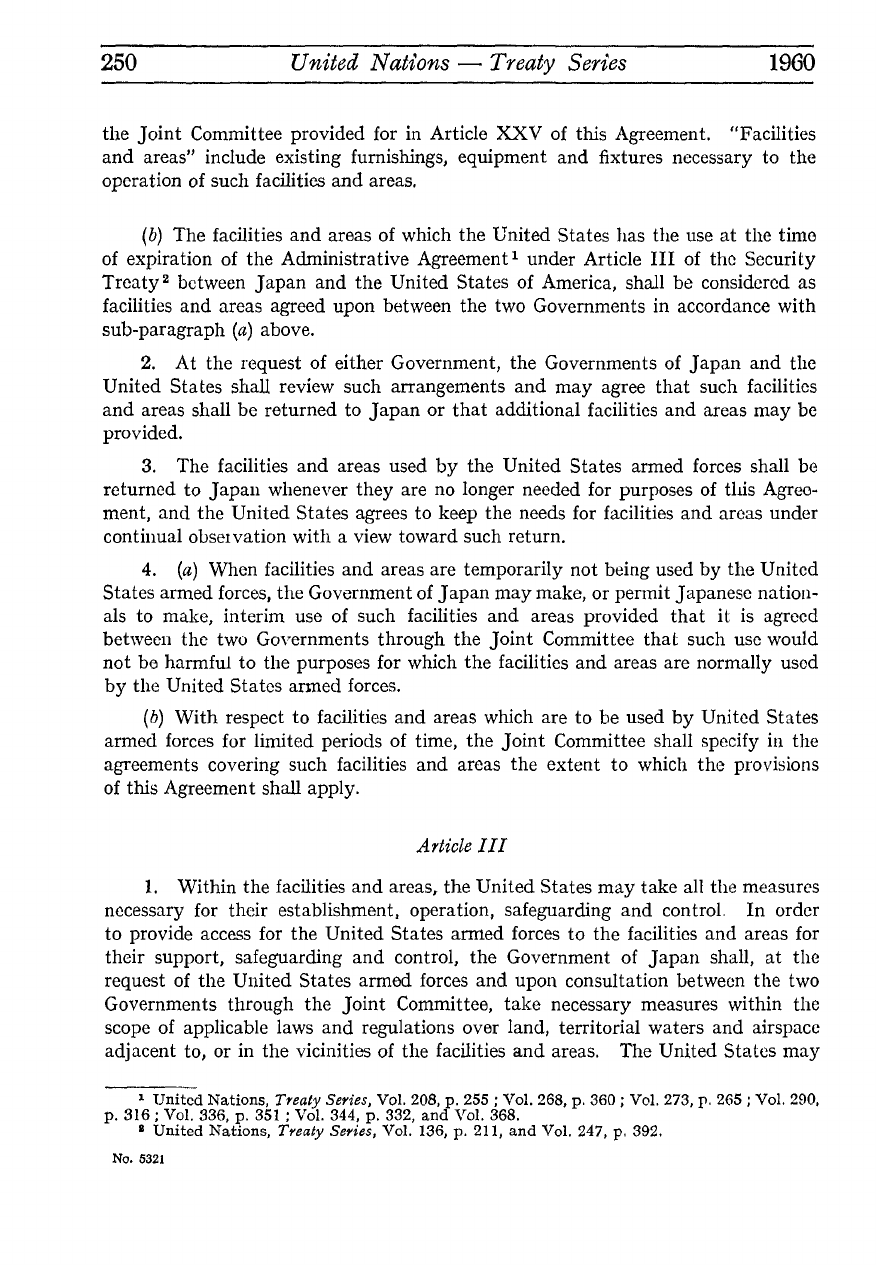
250
United
Nations
—
Treaty
Series
1960
the
Joint
Committee
provided
for in
Article
XXV
of
this
Agreement.
"Facilities
and
areas"
include
existing
furnishings,
equipment
and
fixtures
necessary
to
the
operation
of
such
facilities
and
areas.
(b)
The
facuities
and
areas
of
which
the
United
States
has
the
use
at
the
time
of
expiration
of
the
Administrative
Agreement
1
under
Article
III
of
the
Security
Treaty
2
between
Japan
and the
United
States
of
America,
shall
be
considered
as
facilities
and
areas
agreed
upon
between
the
two
Governments
in
accordance
with
sub-paragraph
(a)
above.
2.
At
the
request
of
either
Government,
the
Governments
of
Japan
and
the
United
States
shaU
review
such
arrangements
and
may
agree
that
such
facilities
and
areas
shall be
returned
to
Japan
or
that
additional
facilities
and
areas
may
be
provided.
3.
The
facilities
and
areas
used
by the
United
States
armed
forces
shall
be
returned
to
Japan
whenever
they
are
no
longer
needed
for
purposes
of
this
Agree
ment,
and
the
United
States
agrees
to
keep
the
needs
for
facilities
and
areas
under
continual obseivation
with
a
view
toward
such
return.
4.
(a)
When
facilities
and
areas
are
temporarily
not
being
used
by
the
United
States
armed
forces,
the
Government
of
Japan
may
make,
or
permit
Japanese
nation
als
to
make,
interim
use
of
such
facilities
and
areas
provided
that
it
is
agreed
between
the
two
Governments
through
the
Joint
Committee
that
such use would
not
be
harmful
to
the
purposes
for
which
the
facilities
and
areas
are
normally
used
by
the
United
States
armed
forces.
(b)
With
respect
to
facilities
and
areas
which
are
to
be
used
by
United
States
armed
forces
for
limited
periods
of
time,
the
Joint
Committee
shall
specify
in
the
agreements
covering
such
facilities
and
areas
the extent
to
which
the
provisions
of
this
Agreement
shall
apply.
Article
III
1.
Within
the
facilities
and
areas,
the
United
States
may
take
all
the
measures
necessary
for
their
establishment,
operation,
safeguarding
and
control.
In
order
to
provide
access
for
the
United
States
armed
forces
to
the
facilities
and
areas
for
their
support,
safeguarding
and
control,
the
Government
of
Japan
shall,
at
the
request
of
the
United
States
armed
forces
and
upon
consultation
between
the
two
Governments
through
the
Joint
Committee,
take
necessary measures
within
the
scope
of
applicable
laws
and
regulations
over
land,
territorial
waters
and
airspace
adjacent
to,
or
in
the
vicinities
of
the
facilities
and
areas.
The
United
States
may
1
United
Nations,
Treaty
Series,
Vol.
208,
p.
255
;
Vol.
268,
p.
360
;
Vol.
273,
p.
265
;
Vol.
290,
p.
316
;
Vol.
336,
p.
351
;
Vol. 344,
p.
332,
and
Vol.
368.
»
United
Nations,
Treaty
Series,
Vol.
136,
p.
211,
and
Vol.
247,
p,
392.
No.
5321
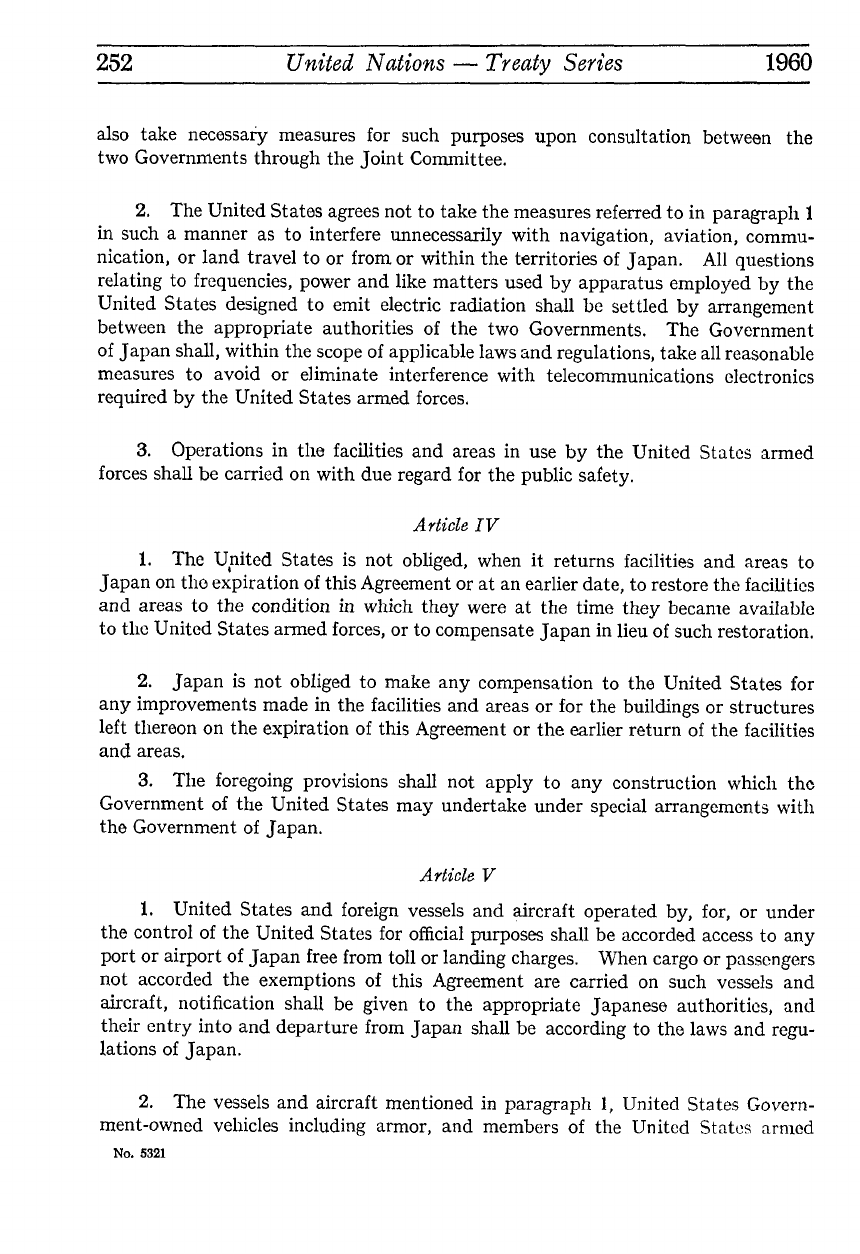
252
United,
Nations
—
Treaty
Series
1960
also
take
necessary
measures
for
such
purposes
upon
consultation
between
the
two
Governments
through
the
Joint
Committee.
2.
The
United
States
agrees
not
to
take the
measures
referred
to in
paragraph
1
in
such
a
manner
as
to
interfere
unnecessarily
with
navigation,
aviation,
commu
nication,
or
land
travel
to
or
from
or
within
the
territories
of
Japan.
All
questions
relating
to
frequencies,
power
and
like
matters
used
by
apparatus
employed
by
the
United
States
designed
to
emit
electric
radiation
shall
be
settled
by
arrangement
between
the
appropriate
authorities
of
the
two
Governments.
The
Government
of
Japan
shall,
within
the
scope
of
applicable
laws
and
regulations,
take
all
reasonable
measures
to
avoid
or eliminate
interference
with
telecommunications
electronics
required
by the
United
States
armed
forces.
3.
Operations
in
the
facilities
and
areas
in
use
by
the
United
States
armed
forces
shall be
carried
on
with
due
regard
for
the
public
safety.
Article
IV
1.
The
United
States
is
not
obliged,
when
it
returns
facilities
and
areas
to
Japan
on
the
expiration
of
this
Agreement
or
at
an
earlier
date,
to
restore
the
facilities
and
areas
to
the
condition
in
which
they
were
at
the
time
they
became
available
to
the
United
States
armed
forces,
or
to
compensate
Japan
in
lieu
of
such
restoration.
2.
Japan
is
not
obliged
to
make
any
compensation
to
the
United
States
for
any
improvements
made
in
the
facilities
and
areas
or
for
the
buildings
or
structures
left
thereon
on
the
expiration
of
this
Agreement
or
the
earlier
return
of
the
facilities
and
areas.
3.
The
foregoing
provisions
shall
not
apply
to
any
construction
which
the
Government
of
the
United
States
may
undertake
under
special
arrangements
with
the
Government
of
Japan.
Article
V
1.
United
States
and
foreign
vessels
and aircraft
operated
by,
for,
or
under
the
control
of
the
United
States
for
official
purposes
shall
be accorded
access
to
any
port
or
airport
of
Japan
free
from
toll or
landing
charges.
When
cargo
or
passengers
not
accorded
the
exemptions
of
this
Agreement
are
carried
on
such
vessels
and
aircraft,
notification
shall
be
given
to
the
appropriate
Japanese
authorities,
and
their
entry
into
and
departure
from
Japan
shall be
according
to
the
laws
and
regu
lations
of
Japan.
2.
The
vessels
and
aircraft
mentioned
in
paragraph
1,
United
States
Govern
ment-owned
vehicles
including
armor,
and
members
of
the
United
States
armed
No.
5321
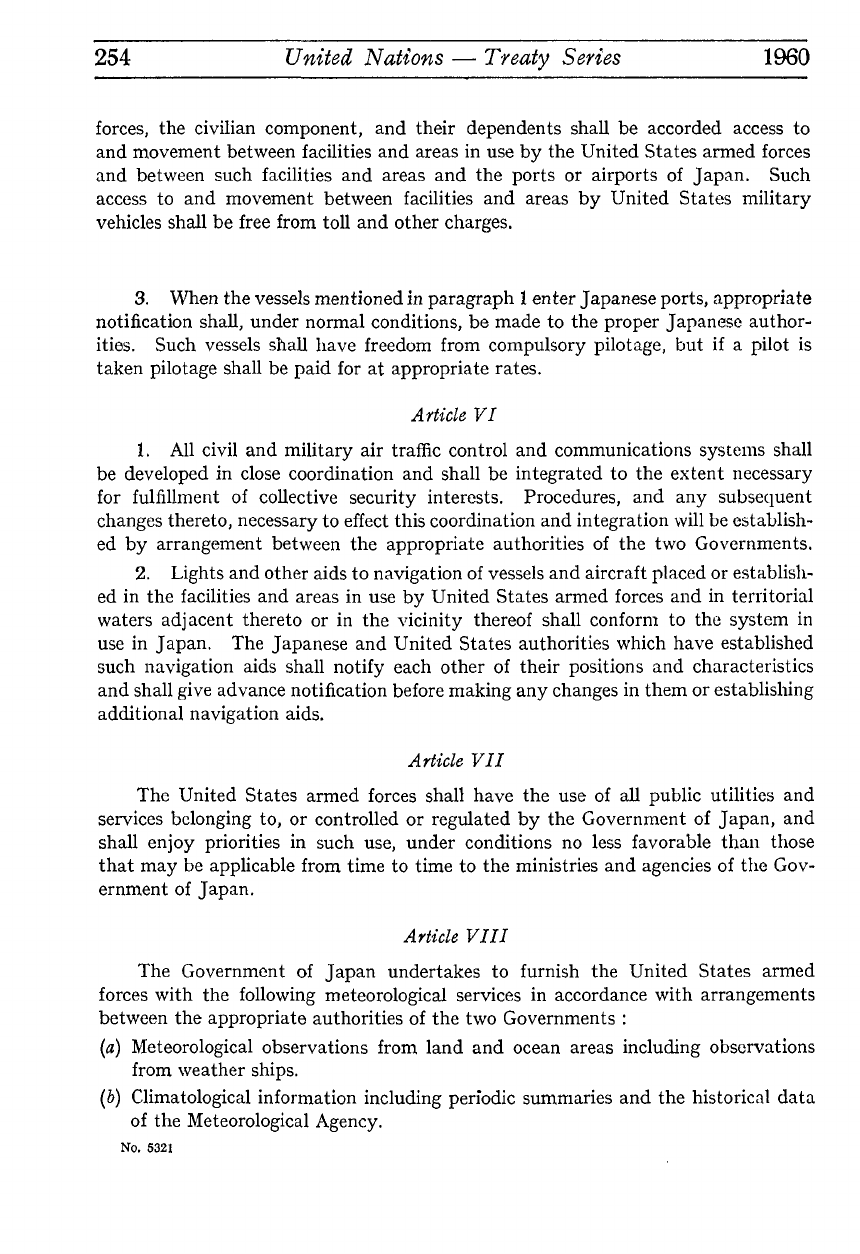
254
United
Nations
—
Treaty
Series
1960
forces,
the
civilian
component,
and
their
dependents
shall
be accorded
access
to
and
movement
between
facilities
and
areas
in
use
by
the
United
States
armed
forces
and
between
such
facilities
and
areas
and
the
ports
or
airports
of
Japan.
Such
access
to
and
movement
between
facilities
and
areas
by
United
States
military
vehicles
shall
be
free
from
toll
and
other
charges.
3.
When
the
vessels
mentioned
in
paragraph
1
enter
Japanese
ports,
appropriate
notification
shall,
under
normal
conditions,
be
made
to
the
proper
Japanese
author
ities.
Such
vessels
shall
have
freedom
from
compulsory
pilotage,
but
if
a
pilot
is
taken
pilotage
shall
be
paid
for
at
appropriate
rates.
Article
VI
1.
All
civil
and
military
air
traffic
control
and
communications
systems
shall
be developed
in
close
coordination
and
shall
be
integrated
to
the
extent
necessary
for
fulfillment
of
collective
security
interests.
Procedures,
and
any
subsequent
changes
thereto,
necessary
to
effect
this
coordination
and
integration
will
be
establish
ed
by
arrangement
between
the
appropriate
authorities
of
the
two
Governments.
2.
Lights
and
other
aids
to
navigation
of
vessels
and aircraft
placed
or
establish
ed
in
the
facilities
and
areas
in
use
by
United
States
armed
forces
and
in
territorial
waters
adjacent
thereto
or
in
the
vicinity
thereof
shall
conform
to
the
system
in
use
in
Japan.
The
Japanese
and
United
States
authorities
which
have
established
such
navigation
aids
shall
notify
each
other
of
their
positions
and
characteristics
and
shall
give
advance
notification
before
making
any
changes
in
them
or
establishing
additional
navigation
aids.
Article
VII
The
United
States
armed
forces
shall
have
the
use
of
all
public
utilities
and
services
belonging
to,
or
controlled
or
regulated
by the
Government
of
Japan,
and
shall
enjoy
priorities
in
such
use,
under
conditions
no
less
favorable
than
those
that
may
be
applicable
from
time
to
time
to
the
ministries
and
agencies
of
the
Gov
ernment
of
Japan.
Article
VIII
The
Government
of
Japan
undertakes
to
furnish
the
United
States
armed
forces
with
the
following
meteorological
services
in
accordance
with
arrangements
between
the
appropriate
authorities
of
the
two
Governments
:
(a)
Meteorological
observations
from
land
and
ocean
areas
including
observations
from
weather
ships.
(&)
Climatological
information
including
periodic
summaries
and
the
historical
data
of
the
Meteorological
Agency.
No.
5321
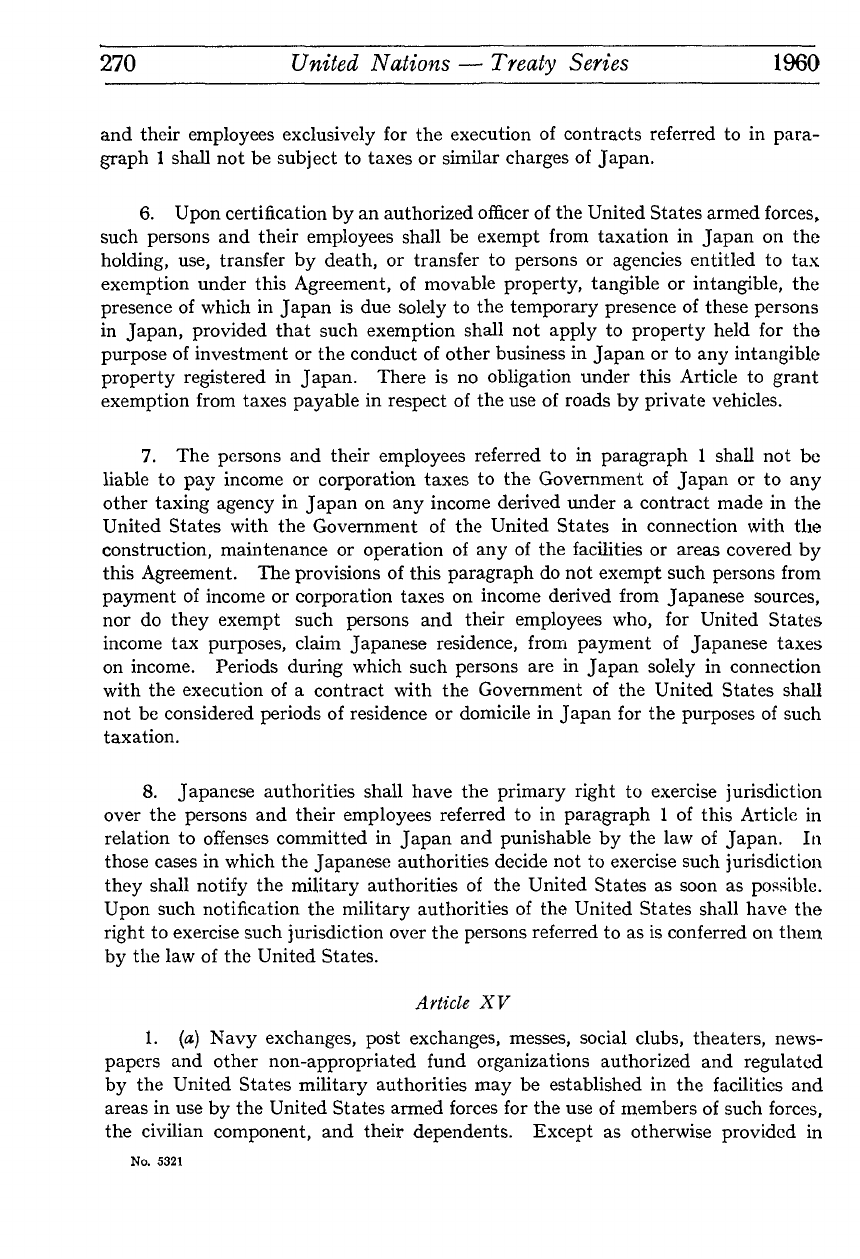
270
United
Nations
—
Treaty
Series
1960
and
their
employees
exclusively
for
the
execution
of
contracts
referred
to
in
para
graph
1
shall
not
be
subject
to
taxes
or
similar
charges
of
Japan.
6.
Upon
certification
by
an
authorized
officer
of
the
United
States
armed
forces,
such
persons
and
their
employees
shall be
exempt
from
taxation
in
Japan
on
the
holding,
use,
transfer
by
death,
or
transfer
to
persons
or
agencies
entitled
to
tax
exemption
under
this
Agreement,
of
movable
property,
tangible
or
intangible,
the
presence
of
which
in
Japan
is
due
solely
to
the
temporary
presence
of
these
persons
in
Japan,
provided
that
such
exemption
shall
not
apply
to
property
held
for
the
purpose
of
investment
or
the
conduct
of
other
business
in
Japan
or
to
any
intangible
property
registered
in
Japan.
There
is
no
obligation
under
this
Article
to
grant
exemption
from
taxes
payable
in
respect
of
the
use
of
roads
by
private
vehicles.
7.
The
persons
and
their
employees
referred
to
in
paragraph
1
shall
not
be
liable
to
pay
income
or
corporation
taxes
to
the
Government
of
Japan
or
to
any
other
taxing
agency
in
Japan
on
any
income
derived
under
a
contract
made
in
the
United
States
with
the
Government
of
the
United
States
in
connection
with
the
construction,
maintenance
or
operation
of
any
of
the
facilities
or
areas
covered
by
this
Agreement.
The
provisions
of
this
paragraph
do
not
exempt
such
persons
from
payment
of
income
or
corporation
taxes
on
income
derived
from
Japanese
sources,
nor
do
they
exempt
such
persons
and
their
employees
who,
for
United
States
income
tax
purposes,
claim
Japanese
residence,
from
payment
of
Japanese
taxes
on
income.
Periods
during
which
such
persons
are
in
Japan
solely
in
connection
with
the
execution
of
a
contract
with
the
Government
of
the
United
States
shall
not
be
considered
periods
of
residence
or
domicile
in
Japan
for
the
purposes
of
such
taxation.
8.
Japanese
authorities
shall
have
the
primary
right
to
exercise
jurisdiction
over
the
persons
and
their
employees
referred
to
in
paragraph
1
of
this
Article
in
relation
to
offenses
committed
in
Japan
and
punishable
by
the
law
of
Japan.
In
those
cases
in
which
the
Japanese
authorities
decide
not
to
exercise
such
jurisdiction
they
shall
notify
the
military
authorities
of
the
United
States
as
soon
as
possible.
Upon
such
notification
the
military
authorities
of
the
United
States
shall
have
the
right
to
exercise
such
jurisdiction
over
the
persons
referred
to
as
is
conferred
on
them
by
the
law
of
the
United
States.
Article
XV
1.
(a)
Navy
exchanges,
post
exchanges,
messes,
social
clubs,
theaters,
news
papers
and other non-appropriated
fund
organizations
authorized
and
regulated
by the
United
States
military
authorities
may
be
established
in
the
facilities
and
areas
in
use
by
the
United
States
armed
forces
for
the
use
of
members
of
such
forces,
the
civilian
component,
and
their
dependents.
Except
as
otherwise
provided
in
No.
5321
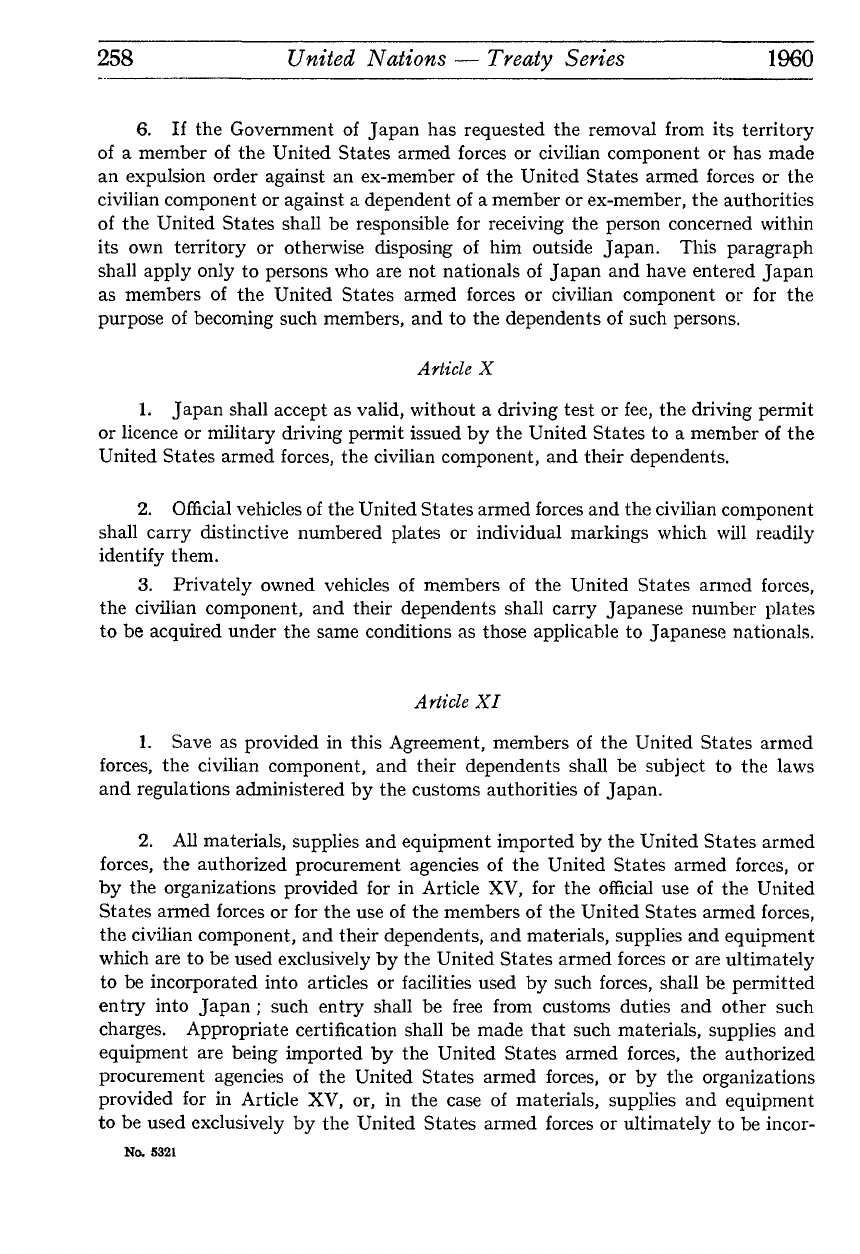
258
United
Nations
—
Treaty
Series
1960
6.
If the
Government
of
Japan
has
requested
the
removal
from
its
territory
of
a
member
of
the
United
States
armed
forces
or civilian
component
or
has
made
an
expulsion
order
against
an
ex-member
of
the
United
States
armed
forces
or
the
civilian
component
or
against
a
dependent
of
a
member
or
ex-member,
the
authorities
of
the
United
States
shall
be
responsible
for
receiving
the
person concerned
within
its
own
territory
or
otherwise
disposing
of
him
outside
Japan.
This
paragraph
shall
apply
only
to
persons
who
are
not
nationals
of
Japan
and
have
entered
Japan
as
members
of
the
United
States
armed
forces
or
civilian
component
or
for
the
purpose
of
becoming
such
members,
and
to
the
dependents
of
such
persons.
Article
X
1.
Japan
shall
accept
as
valid,
without
a
driving
test
or
fee,
the
driving
permit
or
licence
or
military
driving
permit
issued
by
the
United
States
to
a
member
of
the
United
States
armed
forces,
the
civilian
component,
and
their
dependents.
2.
Official
vehicles
of
the
United
States
armed
forces
and
the
civilian
component
shall
carry
distinctive
numbered
plates
or
individual
markings
which
will
readily
identify
them.
3.
Privately
owned
vehicles
of
members
of
the
United
States
armed
forces,
the
civilian
component,
and
their
dependents
shall
carry
Japanese
number
plates
to
be
acquired
under
the
same
conditions
as
those
applicable
to
Japanese
nationals.
Article
XI
1.
Save
as
provided
in
this
Agreement,
members
of
the
United
States
armed
forces,
the
civilian
component,
and
their
dependents
shall be
subject
to
the
laws
and
regulations
administered
by
the
customs
authorities
of
Japan.
2.
All
materials,
supplies
and
equipment
imported by
the
United
States
armed
forces,
the
authorized
procurement
agencies
of
the
United
States
armed
forces,
or
by the
organizations
provided
for
in
Article
XV,
for
the
official
use
of
the
United
States
armed
forces
or
for
the
use
of
the
members
of
the
United
States
armed
forces,
the
civilian
component,
and
their
dependents,
and
materials,
supplies
and equipment
which
are
to
be
used
exclusively
by
the
United
States
armed
forces
or
are
ultimately
to
be
incorporated into
articles
or
facilities
used
by
such
forces,
shall
be
permitted
entry
into
Japan
;
such
entry
shall
be
free
from
customs
duties
and
other
such
charges.
Appropriate
certification
shall
be
made
that
such
materials,
supplies
and
equipment
are
being
imported
by the
United
States
armed
forces,
the
authorized
procurement
agencies
of
the
United
States
armed
forces,
or
by
the
organizations
provided
for
in
Article
XV,
or,
in
the
case
of
materials,
supplies
and
equipment
to
be
used
exclusively
by the
United
States
armed
forces
or
ultimately
to
be
incor-
No.
5321
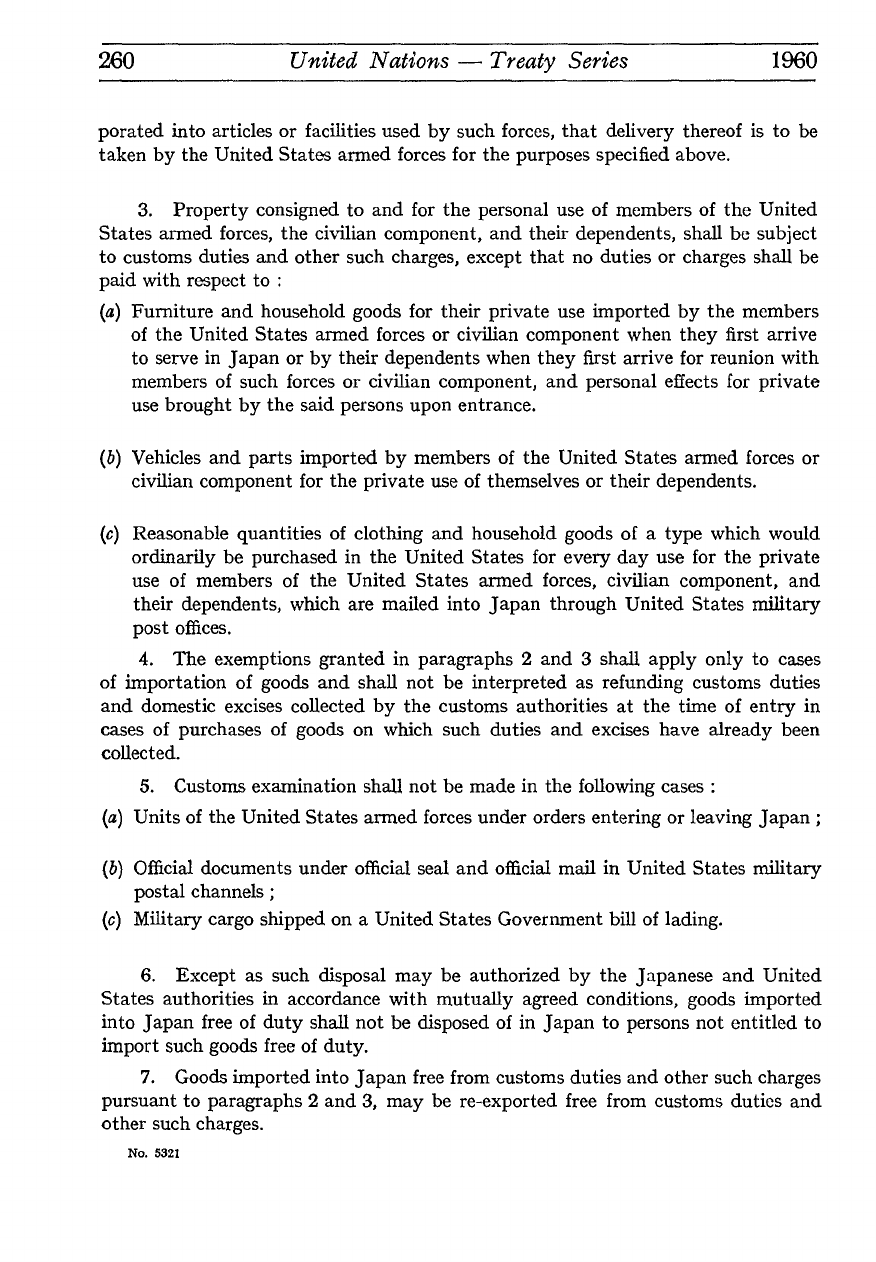
260
United
Nations
Treaty
Series
1960
porated
into
articles
or
facilities
used
by
such
forces,
that
delivery
thereof
is
to
be
taken
by
the
United
States
armed
forces
for
the
purposes
specified
above.
3.
Property
consigned
to
and
for
the
personal
use
of
members
of
the
United
States
armed
forces,
the
civilian
component,
and
their
dependents,
shall
be
subject
to
customs
duties
and
other
such
charges,
except
that
no
duties
or
charges
shall
be
paid
with
respect
to
:
(a)
Furniture
and
household
goods
for
their
private
use
imported
by
the
members
of
the
United States
armed
forces
or
civilian
component
when
they
first
arrive
to
serve
in
Japan
or
by
their
dependents
when
they
first
arrive
for
reunion
with
members
of
such
forces
or
civilian
component,
and
personal
effects
for
private
use
brought
by the
said
persons
upon
entrance.
(b)
Vehicles
and
parts
imported
by
members
of
the
United States
armed
forces
or
civilian
component
for
the
private
use
of
themselves
or
their
dependents.
(c)
Reasonable
quantities
of
clothing
and
household
goods
of
a
type
which
would
ordinarily
be
purchased
in
the
United
States
for
every
day
use
for
the
private
use
of
members
of
the
United
States
armed
forces,
civilian
component,
and
their
dependents,
which
are
mailed
into
Japan
through
United
States
military
post
offices.
4.
The
exemptions
granted
in
paragraphs
2
and
3
shall
apply
only
to
cases
of
importation
of
goods
and
shall
not
be
interpreted
as
refunding
customs
duties
and
domestic
excises
collected
by
the
customs
authorities
at
the
time
of
entry
in
cases
of
purchases
of
goods on
which
such
duties
and
excises
have
already
been
collected.
5.
Customs
examination
shall
not
be
made
in
the
following
cases
:
(a)
Units
of
the
United States
armed
forces
under
orders
entering
or
leaving
Japan
;
(6)
Official
documents
under
official
seal
and
official
mail
in
United States
military
postal
channels
;
(c)
Military
cargo
shipped
on
a
United States
Government
bill
of
lading.
6.
Except
as
such
disposal
may
be
authorized
by the Japanese and
United
States
authorities
in
accordance
with
mutually
agreed
conditions,
goods
imported
into
Japan
free
of
duty
shall
not
be
disposed
of
in
Japan
to
persons
not
entitled
to
import
such
goods
free
of
duty.
7.
Goods
imported
into
Japan
free
from
customs
duties
and
other
such
charges
pursuant
to
paragraphs
2
and
3,
may
be
re-exported
free
from
customs
duties
and
other
such
charges.
No.
5321
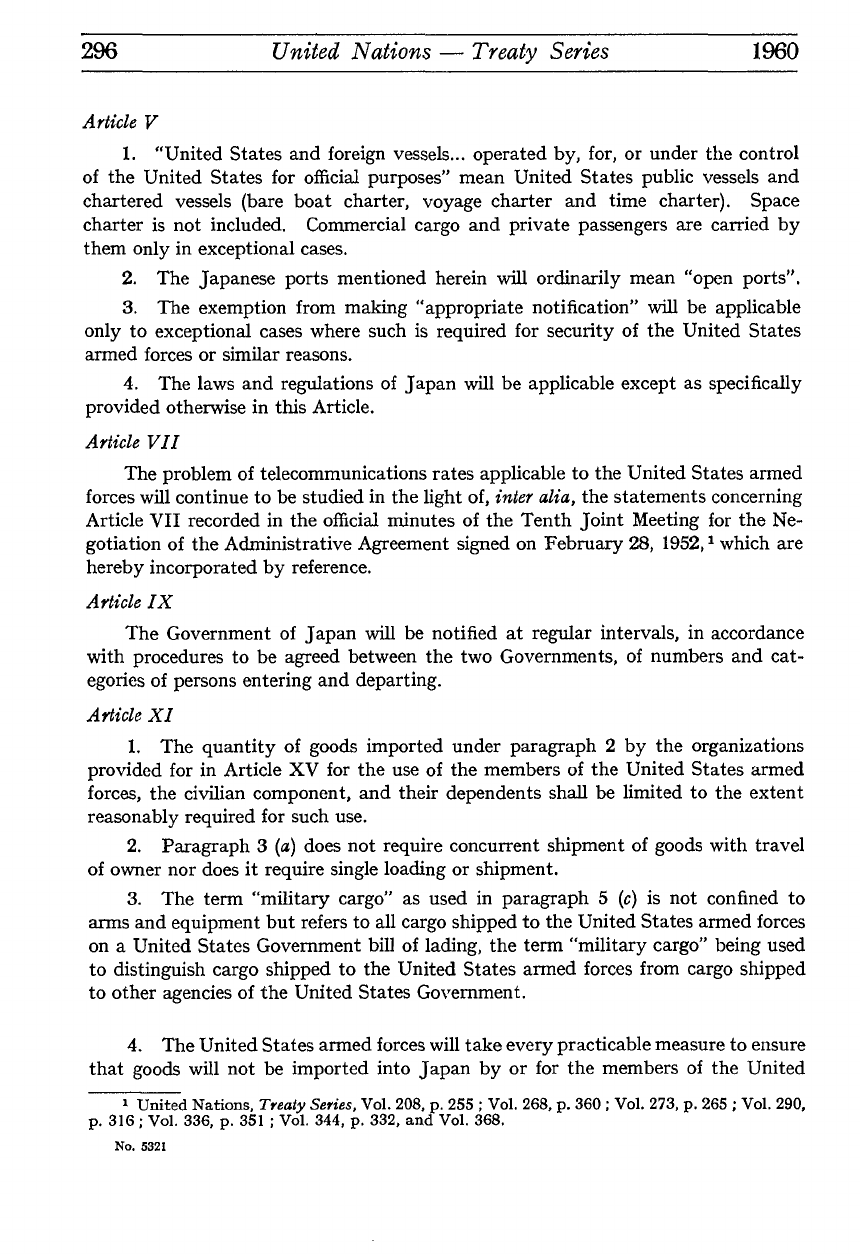
296
United
Nations
—
Treaty
Series
1960
Article
V
1.
"United
States
and
foreign
vessels...
operated
by,
for,
or
under
the
control
of
the
United
States
for
official
purposes"
mean
United
States
public
vessels
and
chartered
vessels
(bare
boat
charter,
voyage
charter
and
time
charter).
Space
charter
is
not
included.
Commercial
cargo
and
private
passengers
are
carried
by
them
only
in
exceptional
cases.
2.
The
Japanese
ports
mentioned
herein
will
ordinarily
mean
"open
ports".
3.
The
exemption
from
making
"appropriate
notification"
will
be
applicable
only
to
exceptional
cases
where
such
is
required
for
security
of
the
United
States
armed
forces
or
similar
reasons.
4.
The
laws
and
regulations
of
Japan
will
be
applicable
except
as
specifically
provided
otherwise
in
this
Article.
Article
VII
The
problem
of
telecommunications
rates
applicable
to
the
United
States
armed
forces
will
continue
to
be
studied
in
the
light
of,
inter
alia,
the statements
concerning
Article
VII
recorded
in
the
official
minutes
of
the
Tenth
Joint
Meeting
for
the
Ne
gotiation
of
the
Administrative
Agreement
signed
on
February
28,
1952,
1
which
are
hereby
incorporated
by
reference.
Article
IX
The
Government
of
Japan
will
be
notified
at
regular
intervals,
in
accordance
with
procedures
to
be
agreed
between
the
two
Governments,
of
numbers
and
cat
egories of
persons
entering
and
departing.
Article
XI
1.
The
quantity
of
goods
imported
under
paragraph
2
by
the
organizations
provided
for
in
Article
XV
for
the
use
of
the
members
of
the
United
States
armed
forces,
the
civilian
component,
and
their
dependents
shall
be
limited
to
the
extent
reasonably
required
for such
use.
2.
Paragraph
3
(a)
does
not
require
concurrent
shipment
of
goods
with
travel
of
owner
nor
does
it
require
single
loading
or
shipment.
3.
The
term "military
cargo"
as
used
in
paragraph
5
(c)
is
not
confined
to
arms
and
equipment
but
refers
to
all
cargo
shipped
to the
United
States
armed
forces
on
a
United
States
Government
bill
of
lading,
the
term
"military
cargo"
being
used
to
distinguish
cargo
shipped
to the
United
States
armed
forces
from
cargo
shipped
to
other
agencies
of
the
United
States
Government.
4.
The
United
States
armed
forces
will
take
every
practicable
measure
to
ensure
that
goods
will
not
be
imported
into
Japan
by
or
for
the
members
of
the
United
1
United
Nations,
Treaty
Series,
Vol.
208,
p.
255
;
Vol. 268,
p.
360
;
Vol.
273,
p.
265
;
Vol. 290,
p.
316
;
Vol. 336,
p.
351
;
Vol.
344,
p.
332,
and
Vol.
368.
No.
5321
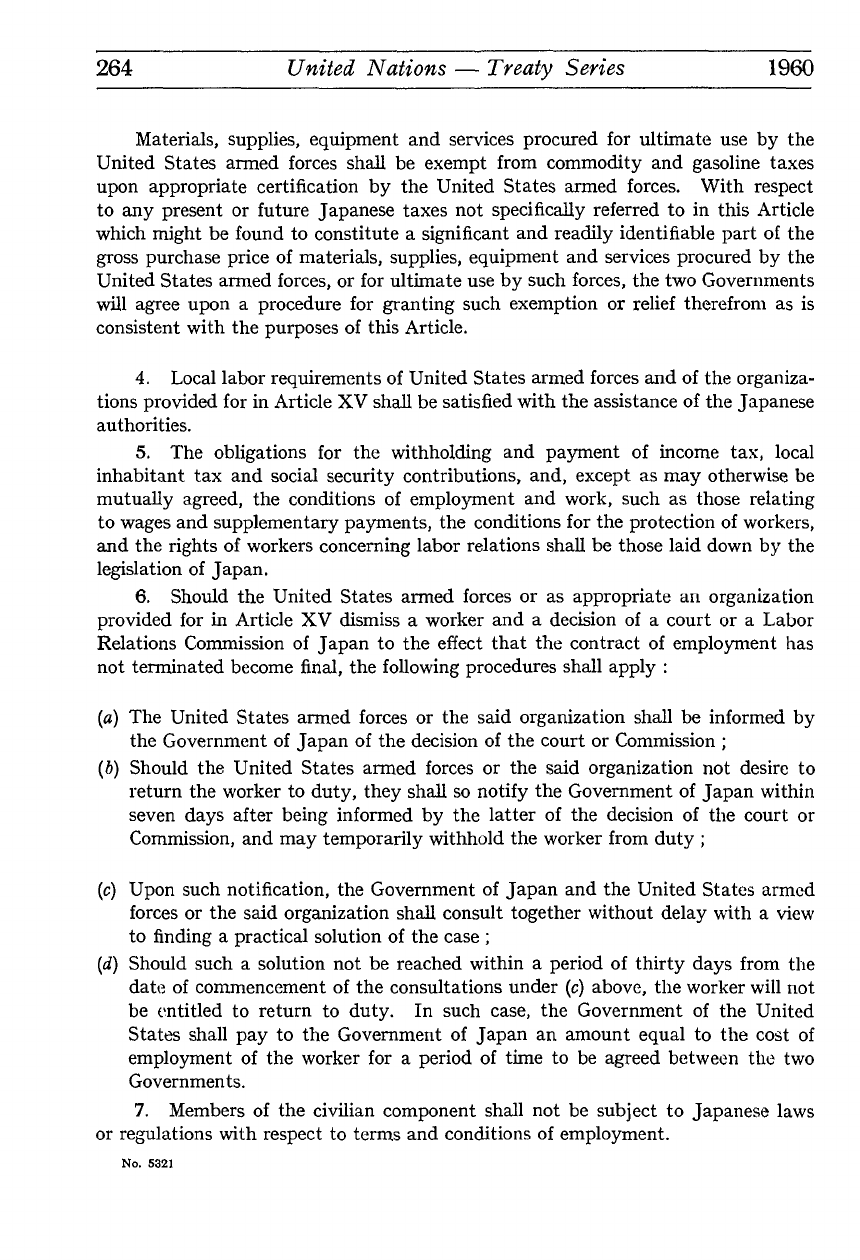
264
United
Nations
—
Treaty
Series
1960
Materials,
supplies,
equipment
and
services
procured
for
ultimate
use
by
the
United
States
armed
forces
shall
be
exempt
from
commodity
and
gasoline
taxes
upon
appropriate
certification
by
the
United
States
armed
forces.
With
respect
to
any
present
or
future
Japanese
taxes
not
specifically
referred
to
in
this
Article
which
might
be
found
to
constitute
a
significant
and
readily
identifiable
part
of
the
gross
purchase
price
of
materials,
supplies,
equipment
and
services
procured
by the
United
States
armed
forces,
or for
ultimate
use
by
such
forces,
the
two
Governments
will
agree
upon
a
procedure
for
granting
such
exemption
or
relief
therefrom
as
is
consistent
with
the
purposes
of
this
Article.
4.
Local
labor
requirements
of
United
States
armed
forces
and
of
the
organiza
tions
provided
for
in
Article
XV
shall
be
satisfied
with
the
assistance
of
the
Japanese
authorities.
5.
The
obligations
for
the
withholding
and
payment
of
income
tax,
local
inhabitant
tax
and
social
security
contributions,
and,
except
as
may
otherwise
be
mutually
agreed,
the
conditions
of
employment
and
work,
such as
those
relating
to
wages
and
supplementary
payments,
the
conditions
for
the
protection
of
workers,
and
the
rights
of
workers
concerning
labor
relations
shall
be
those
laid
down
by the
legislation
of
Japan.
6.
Should
the
United
States
armed
forces
or as
appropriate
an
organization
provided
for
in
Article
XV
dismiss
a
worker
and
a
decision
of
a
court
or
a
Labor
Relations
Commission
of
Japan
to
the
effect
that
the
contract
of
employment
has
not
terminated
become
final,
the
following
procedures
shall
apply
:
(a)
The
United
States
armed
forces
or
the
said
organization
shall
be
informed
by
the
Government
of
Japan
of
the
decision
of
the
court
or
Commission
;
(b)
Should
the
United
States
armed
forces
or
the
said
organization
not
desire
to
return
the
worker
to
duty,
they
shall
so
notify
the
Government
of
Japan
within
seven
days
after
being
informed
by the
latter
of
the
decision
of
the
court
or
Commission,
and
may
temporarily
withhold
the
worker
from
duty
;
(c)
Upon
such
notification,
the
Government
of
Japan
and the
United
States
armed
forces
or
the
said organization
shall
consult
together
without
delay with
a
view
to
finding
a
practical
solution
of
the
case
;
(d)
Should such
a
solution
not
be reached
within
a
period
of
thirty
days
from
the
date
of
commencement
of
the
consultations
under
(c)
above,
the
worker
will
not
be
entitled
to
return
to
duty.
In
such
case,
the
Government
of
the
United
States
shall
pay
to
the
Government
of
Japan
an
amount
equal
to
the
cost
of
employment
of
the
worker
for
a
period
of
time
to
be
agreed
between
the
two
Governments.
7.
Members
of
the
civilian
component
shall
not
be
subject
to
Japanese
laws
or
regulations
with
respect
to
terms
and
conditions
of
employment.
No.
5321
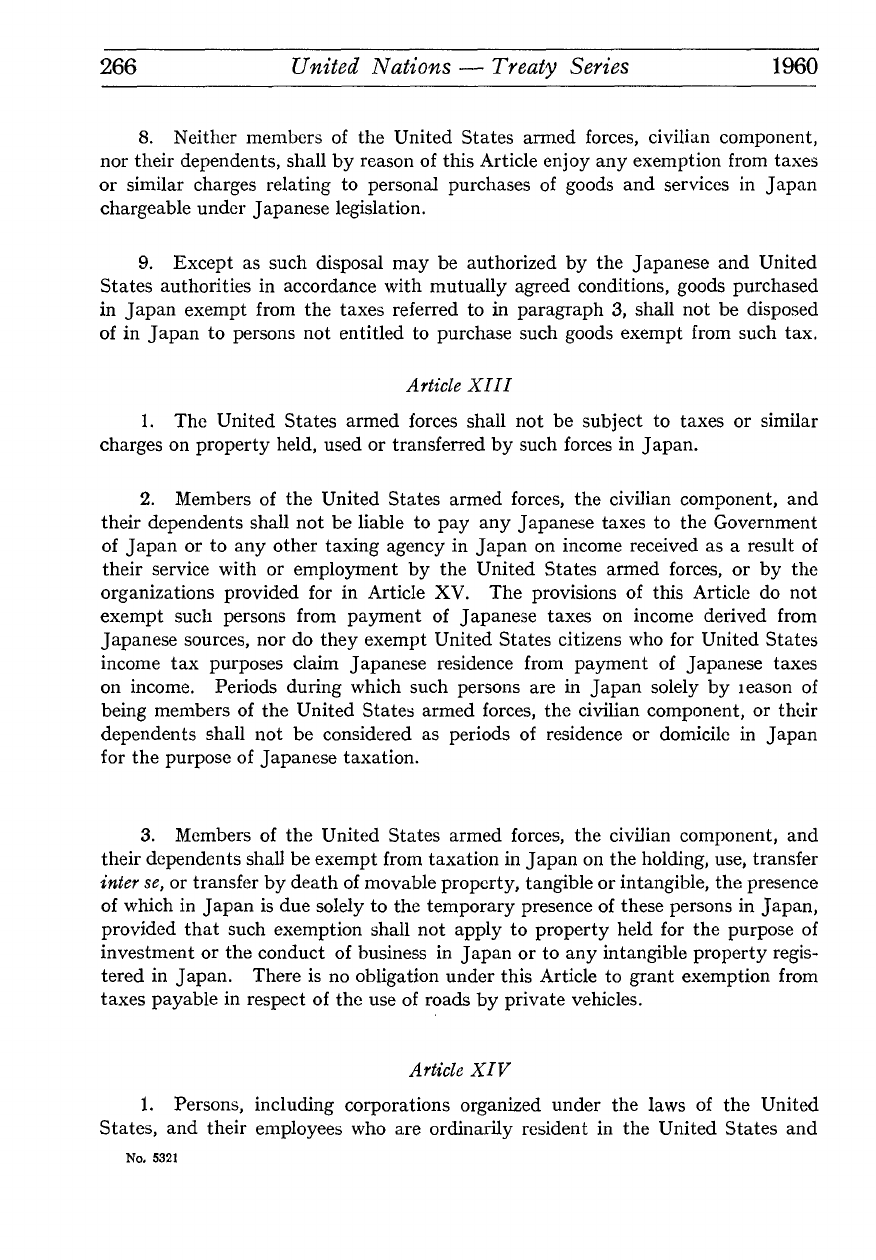
266
United
Nations
—
Treaty
Series
1960
8.
Neither
members
of
the
United
States
armed
forces,
civilian
component,
nor
their
dependents,
shall
by
reason
of
this
Article
enjoy
any
exemption
from
taxes
or
similar
charges
relating
to
personal
purchases
of
goods
and
services
in
Japan
chargeable
under
Japanese
legislation.
9.
Except
as
such
disposal
may
be
authorized
by
the
Japanese
and
United
States
authorities
in
accordance
with
mutually
agreed
conditions,
goods
purchased
in
Japan
exempt
from
the
taxes
referred
to
in
paragraph
3,
shall
not
be
disposed
of
in
Japan
to
persons
not
entitled to
purchase
such
goods
exempt
from
such
tax.
Article
XIII
1.
The
United
States
armed
forces
shall
not
be
subject
to
taxes
or
similar
charges
on
property
held,
used
or
transferred
by
such
forces
in
Japan.
2.
Members
of
the
United
States
armed
forces,
the
civilian
component,
and
their
dependents
shall
not
be
liable
to pay
any
Japanese
taxes
to
the
Government
of
Japan
or
to
any
other taxing
agency
in
Japan
on
income
received
as
a
result
of
their
service
with
or
employment
by the
United
States
armed
forces,
or
by
the
organizations
provided
for in
Article
XV.
The
provisions
of
this
Article
do
not
exempt
such
persons
from
payment
of
Japanese
taxes
on
income
derived
from
Japanese
sources,
nor
do
they
exempt
United
States
citizens
who
for
United
States
income
tax
purposes
claim
Japanese
residence
from
payment
of
Japanese
taxes
on
income.
Periods
during
which
such
persons are
in
Japan
solely
by
leason
of
being
members
of
the
United
States
armed
forces,
the
civilian
component,
or
their
dependents
shall
not
be
considered
as
periods
of
residence
or
domicile
in
Japan
for
the
purpose
of
Japanese
taxation.
3.
Members
of
the
United
States
armed
forces,
the
civilian
component,
and
their
dependents
shall
be
exempt
from
taxation
in
Japan
on
the
holding,
use,
transfer
inter
se,
or
transfer
by
death
of
movable
property,
tangible
or
intangible,
the
presence
of
which
in
Japan
is
due
solely
to
the
temporary
presence
of
these
persons
in
Japan,
provided
that
such
exemption
shall
not
apply
to
property
held
for
the
purpose
of
investment
or
the
conduct
of
business
in
Japan
or
to
any
intangible
property
regis
tered
in
Japan.
There
is
no
obligation
under
this
Article
to
grant
exemption
from
taxes
payable
in
respect
of
the
use
of
roads
by private
vehicles.
Article
XIV
1.
Persons,
including
corporations
organized
under
the
laws
of
the
United
States, and
their
employees
who
are
ordinarily
resident
in
the
United
States
and
No.
5321
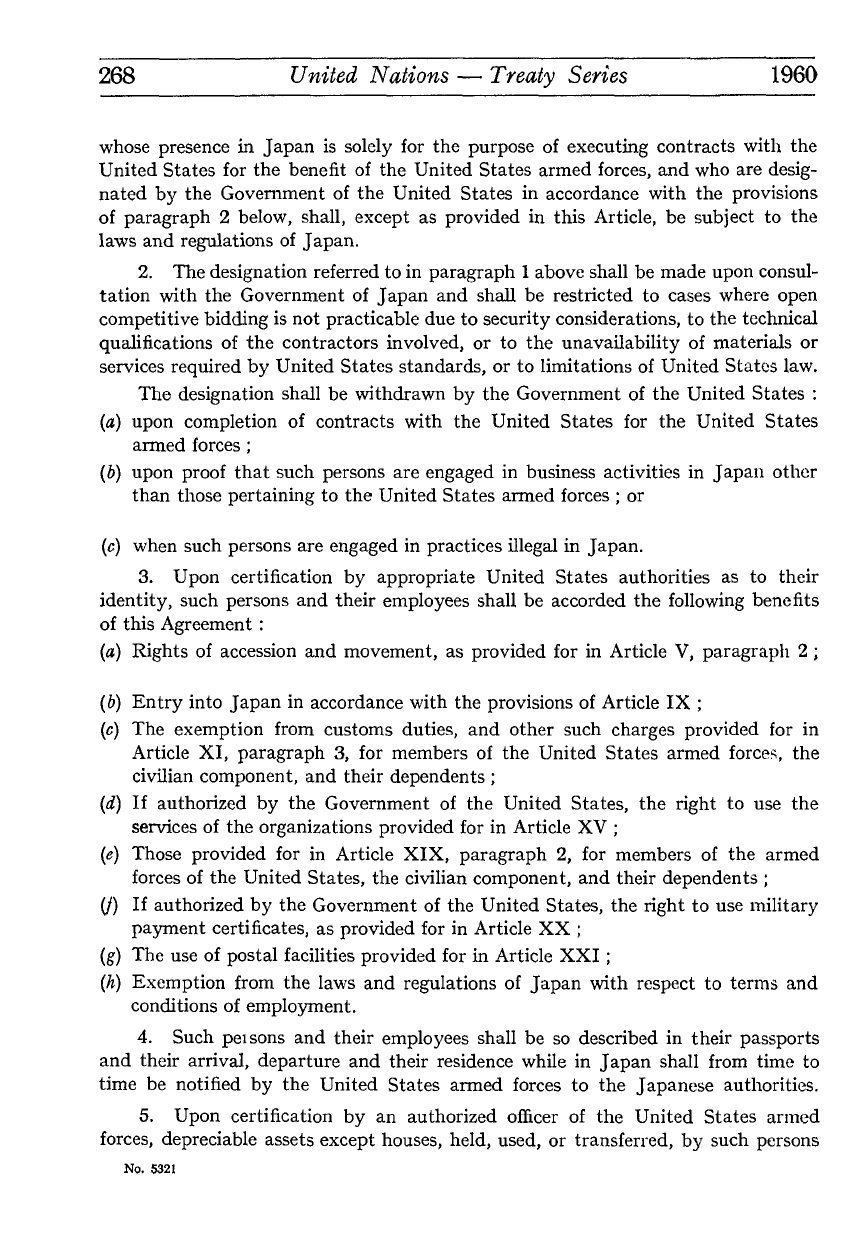
268
United
Nations
—
Treaty
Series
1960
whose
presence
in
Japan
is
solely
for
the
purpose
of
executing
contracts
with
the
United
States
for
the
benefit
of
the
United
States
armed
forces,
and
who
are
desig
nated
by
the
Government
of
the
United
States
in
accordance
with
the
provisions
of
paragraph
2
below,
shall,
except
as
provided
in
this
Article,
be
subject
to
the
laws
and
regulations
of
Japan.
2.
The
designation
referred
to
in
paragraph
1
above
shall
be
made
upon
consul
tation
with
the
Government
of
Japan
and
shall
be
restricted
to
cases
where
open
competitive
bidding
is
not
practicable
due
to
security
considerations,
to
the
technical
qualifications
of
the
contractors
involved,
or
to
the
unavailability
of
materials
or
services
required
by
United
States
standards,
or
to
limitations
of
United
States
law.
The
designation
shall
be
withdrawn
by the
Government
of
the
United
States
:
(a)
upon
completion
of
contracts
with
the
United
States
for
the
United
States
armed
forces
;
(b)
upon
proof
that
such
persons
are
engaged
in
business
activities
in
Japan
other
than
those
pertaining
to
the
United
States
armed
forces
;
or
(c)
when
such persons are
engaged
in
practices
illegal
in
Japan.
3.
Upon
certification
by
appropriate
United
States
authorities
as
to
their
identity,
such persons
and
their
employees
shall
be
accorded
the
following
benefits
of
this
Agreement
:
(a)
Rights
of
accession
and
movement,
as
provided
for
in
Article
V,
paragraph
2
;
(b)
Entry
into
Japan
in
accordance
with
the
provisions
of
Article
IX
;
(c)
The
exemption
from
customs
duties,
and other
such
charges
provided
for
in
Article
XI,
paragraph
3,
for
members
of
the
United
States
armed
forces,
the
civilian
component,
and
their
dependents
;
(d)
If
authorized
by the
Government
of
the
United
States,
the
right
to
use
the
services
of
the
organizations
provided
for
in
Article
XV
;
(e)
Those
provided
for
in
Article
XIX,
paragraph
2,
for
members
of
the
armed
forces
of
the
United
States,
the
civilian
component,
and
their
dependents
;
(/)
If
authorized
by
the
Government
of
the
United
States,
the
right
to
use
military
payment
certificates,
as
provided
for
in
Article
XX
;
(g)
The
use
of
postal
facilities
provided
for
in
Article
XXI
;
(h)
Exemption
from
the
laws
and
regulations
of
Japan
with
respect
to
terms
and
conditions
of
employment.
4.
Such
peisons
and
their
employees shall
be
so
described
in
their
passports
and
their
arrival,
departure and
their
residence
while
in
Japan
shall
from
time
to
time
be
notified
by the
United
States
armed
forces
to the Japanese
authorities.
5.
Upon
certification
by
an
authorized
officer
of
the
United
States
armed
forces,
depreciable
assets
except
houses,
held,
used,
or
transferred,
by
such
persons
No.
5321
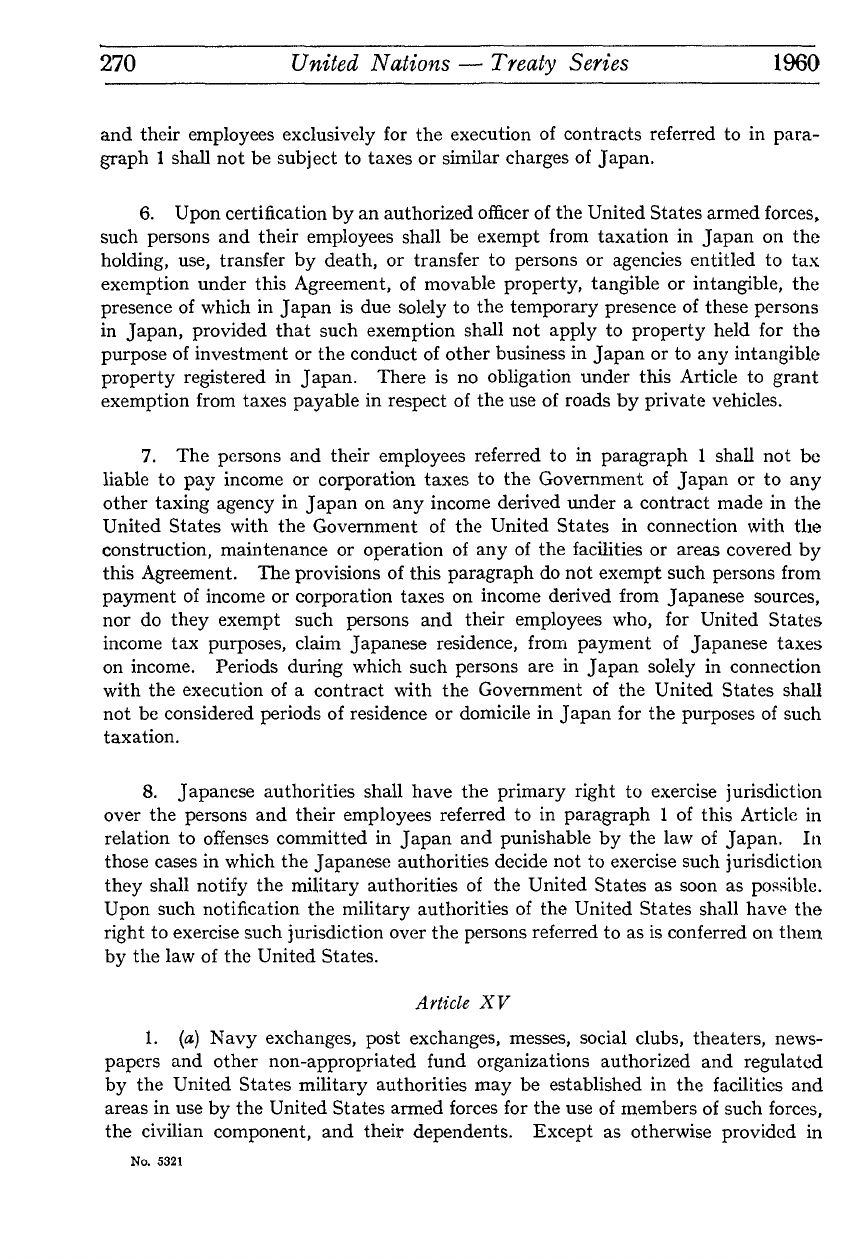
270
United
Nations
—
Treaty
Series
1960
and
their
employees
exclusively
for
the
execution
of
contracts
referred
to
in
para
graph
1
shall
not
be
subject
to
taxes
or
similar
charges
of
Japan.
6.
Upon
certification
by
an
authorized
officer
of
the
United
States
armed
forces,
such
persons
and
their
employees
shall be
exempt
from
taxation
in
Japan
on
the
holding,
use,
transfer
by
death,
or
transfer
to
persons
or
agencies
entitled
to
tax
exemption
under
this
Agreement,
of
movable
property,
tangible
or
intangible,
the
presence
of
which
in
Japan
is
due
solely
to
the
temporary
presence
of
these
persons
in
Japan,
provided
that
such
exemption
shall
not
apply
to
property
held
for
the
purpose
of
investment
or
the
conduct
of
other
business
in
Japan
or
to
any
intangible
property
registered
in
Japan.
There
is
no
obligation
under
this
Article
to
grant
exemption
from
taxes
payable
in
respect
of
the
use
of
roads
by
private
vehicles.
7.
The
persons
and
their
employees
referred
to
in
paragraph
1
shall
not
be
liable
to
pay
income
or
corporation
taxes
to
the
Government
of
Japan
or
to
any
other
taxing
agency
in
Japan
on
any
income
derived
under
a
contract
made
in
the
United
States
with
the
Government
of
the
United
States
in
connection
with
the
construction,
maintenance
or
operation
of
any
of
the
facilities
or
areas
covered
by
this
Agreement.
The
provisions
of
this
paragraph
do
not
exempt
such
persons
from
payment
of
income
or
corporation
taxes
on
income
derived
from
Japanese
sources,
nor
do
they
exempt
such
persons
and
their
employees
who,
for
United
States
income
tax
purposes,
claim
Japanese
residence,
from
payment
of
Japanese
taxes
on
income.
Periods
during
which
such
persons
are
in
Japan
solely
in
connection
with
the
execution
of
a
contract
with
the
Government
of
the
United
States
shall
not
be
considered
periods
of
residence
or
domicile
in
Japan
for
the
purposes
of
such
taxation.
8.
Japanese
authorities
shall
have
the
primary
right
to
exercise
jurisdiction
over
the
persons
and
their
employees
referred
to
in
paragraph
1
of
this
Article
in
relation
to
offenses
committed
in
Japan
and
punishable
by
the
law
of
Japan.
In
those
cases
in
which
the
Japanese
authorities
decide
not
to
exercise
such
jurisdiction
they
shall
notify
the
military
authorities
of
the
United
States
as
soon
as
possible.
Upon
such
notification
the
military
authorities
of
the
United
States
shall
have
the
right
to
exercise
such
jurisdiction
over
the
persons
referred
to
as
is
conferred
on
them
by
the
law
of
the
United
States.
Article
XV
1.
(a)
Navy
exchanges,
post
exchanges,
messes,
social
clubs,
theaters,
news
papers
and other non-appropriated
fund
organizations
authorized
and
regulated
by the
United
States
military
authorities
may
be
established
in
the
facilities
and
areas
in
use
by
the
United
States
armed
forces
for
the
use
of
members
of
such
forces,
the
civilian
component,
and
their
dependents.
Except
as
otherwise
provided
in
No.
5321
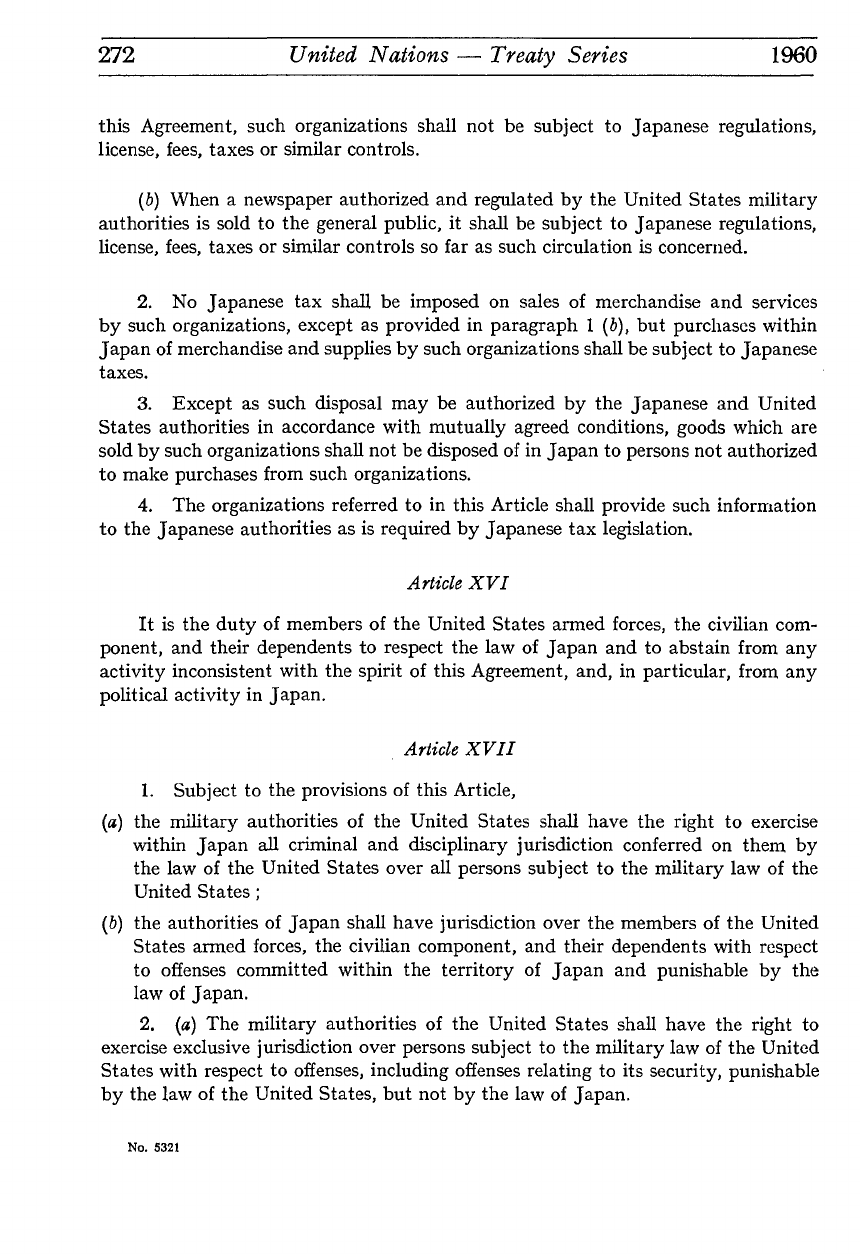
272
United
Nations
Treaty
Series
1960
this
Agreement,
such
organizations
shall
not
be
subject
to
Japanese
regulations,
license,
fees,
taxes
or
similar
controls.
(b)
When
a
newspaper
authorized
and regulated
by the
United
States
military
authorities
is
sold
to
the
general
public,
it
shall be
subject
to
Japanese
regulations,
license,
fees,
taxes
or
similar
controls
so
far
as
such
circulation
is
concerned.
2.
No
Japanese
tax
shall be
imposed
on
sales
of
merchandise
and
services
by
such
organizations,
except
as
provided
in
paragraph
1
(b),
but
purchases
within
Japan
of
merchandise
and
supplies
by
such
organizations
shall
be
subject
to
Japanese
taxes.
3.
Except
as
such
disposal
may
be
authorized
by
the
Japanese
and
United
States
authorities
in
accordance
with
mutually
agreed
conditions,
goods
which
are
sold
by
such
organizations
shall
not
be
disposed
of
in
Japan
to
persons
not
authorized
to
make
purchases
from
such
organizations.
4.
The
organizations
referred
to
in
this
Article
shall
provide
such
information
to
the
Japanese
authorities
as
is
required
by
Japanese
tax
legislation.
Article
XVI
It
is
the
duty
of
members
of
the
United States
armed
forces,
the
civilian
com
ponent,
and
their
dependents
to
respect
the
law
of
Japan
and
to
abstain
from
any
activity
inconsistent
with
the
spirit
of
this
Agreement,
and,
in
particular,
from
any
political
activity
in
Japan.
Article
XVII
1.
Subject
to the
provisions
of
this
Article,
(a)
the
military
authorities
of
the
United
States
shall
have
the
right
to
exercise
within
Japan
all
criminal
and
disciplinary
jurisdiction
conferred
on
them
by
the
law
of
the
United
States
over
all
persons
subject
to
the
military
law
of
the
United
States
;
(b)
the
authorities
of
Japan
shall
have
jurisdiction
over
the
members
of
the
United
States
armed
forces,
the
civilian
component,
and
their
dependents
with
respect
to
offenses
committed
within
the
territory
of
Japan
and
punishable
by the
law
of
Japan.
2.
(a)
The
military
authorities
of
the
United
States
shall
have
the
right
to
exercise
exclusive
jurisdiction
over
persons
subject
to
the
military
law
of
the
United
States
with
respect
to
offenses,
including
offenses
relating
to
its
security,
punishable
by
the
law
of
the
United
States,
but
not
by
the
law
of
Japan.
No.
5321
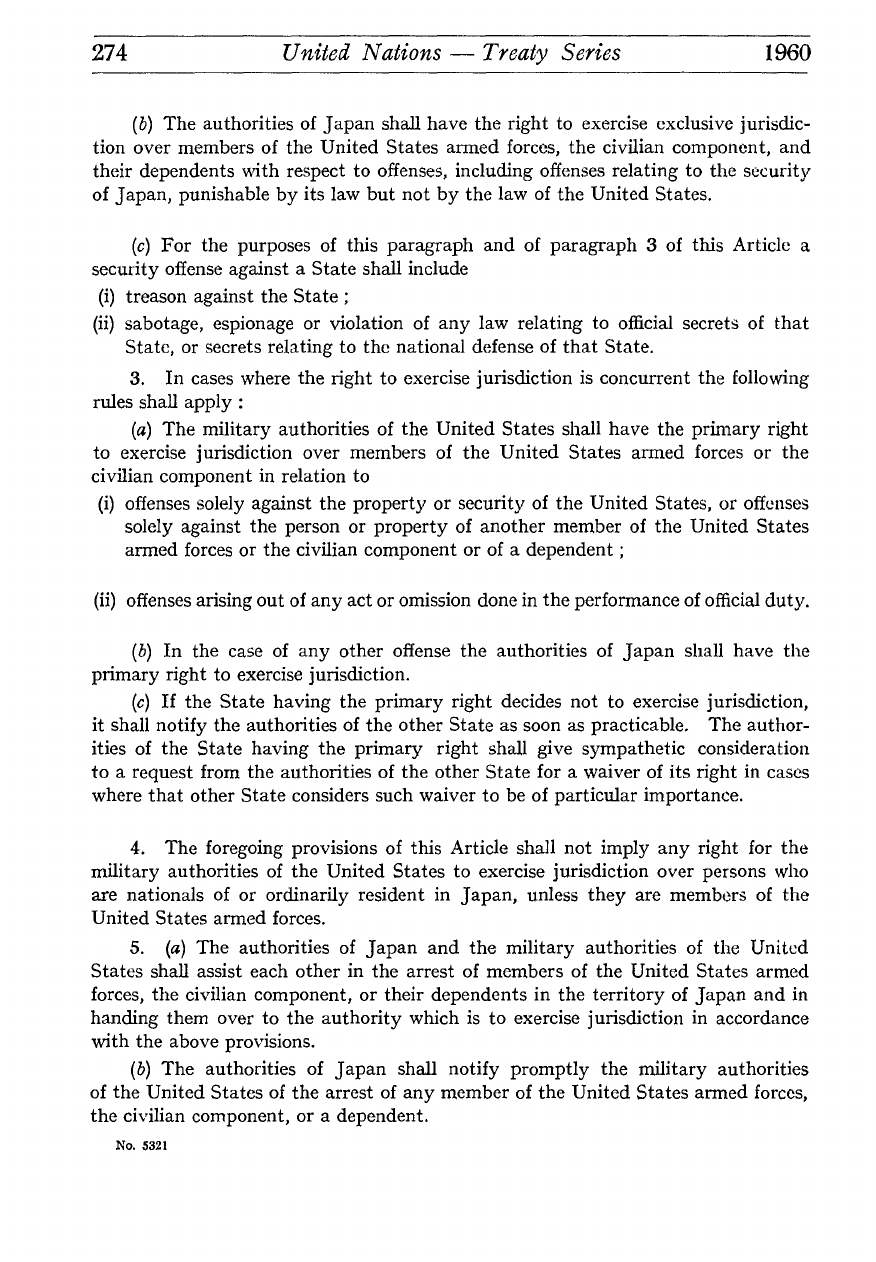
274
United
Nations
—
Treaty
Series
1960
(b)
The
authorities
of
Japan
shall
have
the
right
to
exercise
exclusive
jurisdic
tion
over
members
of
the
United
States
armed
forces,
the
civilian
component,
and
their
dependents
with
respect
to
offenses,
including
offenses
relating
to
the
security
of
Japan,
punishable
by
its
law
but
not
by
the
law
of
the
United
States.
(c)
For
the
purposes
of
this
paragraph
and
of
paragraph
3
of
this
Article
a
security
offense
against
a
State
shall
include
(i)
treason
against
the
State
;
(ii)
sabotage,
espionage
or
violation
of
any
law
relating
to
official
secrets
of
that
State,
or
secrets
relating
to
the
national
defense
of
that
State.
3.
In
cases
where
the
right
to
exercise
jurisdiction
is
concurrent
the
following
rules
shall
apply
:
(a)
The
military
authorities
of
the
United
States
shall
have
the
primary
right
to
exercise
jurisdiction
over
members
of
the
United
States
armed
forces
or
the
civilian
component
in
relation
to
(i)
offenses
solely
against
the
property
or
security
of
the
United
States,
or
offenses
solely
against
the
person
or
property
of
another
member
of
the
United
States
armed
forces
or
the
civilian
component or
of
a
dependent
;
(ii)
offenses
arising
out
of
any
act
or
omission
done
in
the
performance
of
official
duty.
(b)
In
the
case
of
any
other
offense
the
authorities
of
Japan
shall
have
the
primary
right
to
exercise
jurisdiction.
(c)
If the State
having
the
primary
right
decides
not
to
exercise
jurisdiction,
it
shall
notify
the
authorities
of
the
other
State
as
soon
as
practicable.
The
author
ities
of
the
State
having
the
primary
right
shall
give
sympathetic
consideration
to
a
request
from
the
authorities
of
the
other
State
for
a
waiver
of
its
right
in
cases
where
that
other
State
considers
such
waiver
to
be
of
particular
importance.
4.
The
foregoing
provisions
of
this
Article
shall
not
imply
any
right
for
the
military
authorities
of
the
United
States
to
exercise
jurisdiction
over
persons
who
are
nationals
of
or
ordinarily
resident
in
Japan,
unless
they
are
members
of
the
United
States
armed
forces.
5.
(a)
The
authorities
of
Japan
and
the
military
authorities
of
the
United
States
shall
assist
each
other
in
the
arrest
of
members
of
the
United
States
armed
forces,
the
civilian
component,
or
their
dependents
in
the
territory
of
Japan
and
in
handing
them
over
to
the
authority
which
is
to
exercise
jurisdiction
in
accordance
with
the
above
provisions.
(b)
The
authorities
of
Japan
shall
notify
promptly
the
military authorities
of
the
United
States
of
the
arrest
of
any
member
of
the
United
States
armed
forces,
the
civilian
component,
or
a
dependent.
No.
5321
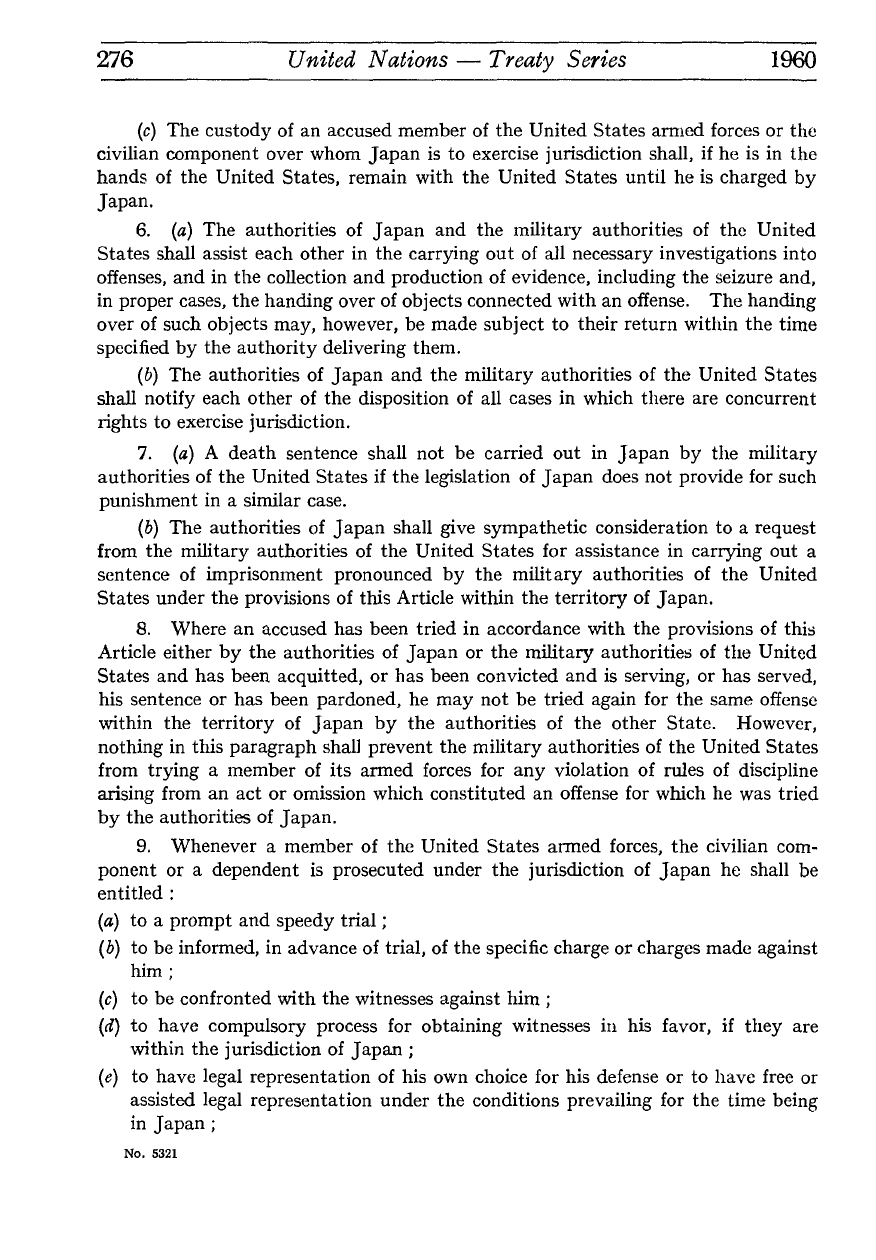
276
United
Nations
—
Treaty
Series
1960
(c)
The
custody
of
an
accused
member
of
the
United
States
armed
forces
or
the
civilian
component
over
whom
Japan
is
to
exercise
jurisdiction
shall,
if
he
is
in
the
hands
of
the
United
States,
remain
with
the
United
States
until
he
is
charged
by
Japan.
6.
(a)
The
authorities
of
Japan
and
the
military authorities
of
the
United
States
shall
assist
each
other
in
the
carrying
out
of
all
necessary
investigations
into
offenses,
and
in
the
collection
and
production
of
evidence,
including
the
seizure
and,
in
proper
cases,
the
handing
over
of
objects
connected
with
an
offense.
The
handing
over
of
such
objects
may,
however,
be
made
subject
to
their
return
within
the
time
specified
by the
authority
delivering
them.
(b)
The
authorities
of
Japan
and
the
military
authorities
of
the
United
States
shall
notify
each
other
of
the
disposition
of
all
cases
in
which
there
are
concurrent
rights
to
exercise
jurisdiction.
7.
(a)
A
death
sentence
shall
not
be
carried
out
in
Japan
by
the
military
authorities
of
the
United
States
if
the
legislation
of
Japan
does
not
provide
for
such
punishment
in
a
similar
case.
(b)
The
authorities
of
Japan
shall
give
sympathetic
consideration
to
a
request
from
the
military authorities
of
the
United
States
for
assistance
in
carrying
out
a
sentence
of
imprisonment
pronounced
by
the
military
authorities
of
the
United
States
under
the
provisions
of
this
Article
within
the
territory
of
Japan.
8.
Where
an
accused
has
been
tried
in
accordance
with
the
provisions
of
this
Article
either
by
the
authorities
of
Japan
or
the
military authorities
of
the
United
States
and
has
been
acquitted,
or
has
been
convicted
and
is
serving,
or
has
served,
his
sentence
or
has
been
pardoned,
he
may
not
be
tried
again
for
the
same
offense
within
the
territory
of
Japan
by
the
authorities
of
the
other
State.
However,
nothing
in
this
paragraph
shall
prevent
the
military
authorities
of
the
United
States
from
trying
a
member
of
its
armed
forces
for
any
violation
of
rules
of
discipline
arising
from
an
act
or
omission
which
constituted
an
offense
for
which
he
was
tried
by
the
authorities
of
Japan.
9.
Whenever
a
member
of
the
United
States
armed
forces,
the
civilian
com
ponent
or
a
dependent
is
prosecuted
under
the
jurisdiction
of
Japan
he
shall be
entitled
:
(«)
to
a
prompt
and
speedy
trial
;
(b)
to
be
informed, in
advance
of
trial,
of
the
specific
charge
or
charges
made
against
him
;
(c)
to
be confronted
with
the
witnesses
against
him
;
(<£)
to
have
compulsory
process
for
obtaining
witnesses
in
his
favor,
if
they
are
within
the
jurisdiction
of
Japan
;
(e)
to
have
legal
representation
of
his
own
choice
for
his
defense
or
to
have
free
or
assisted
legal
representation
under
the
conditions
prevailing
for
the
time
being
in
Japan
;
No.
5321
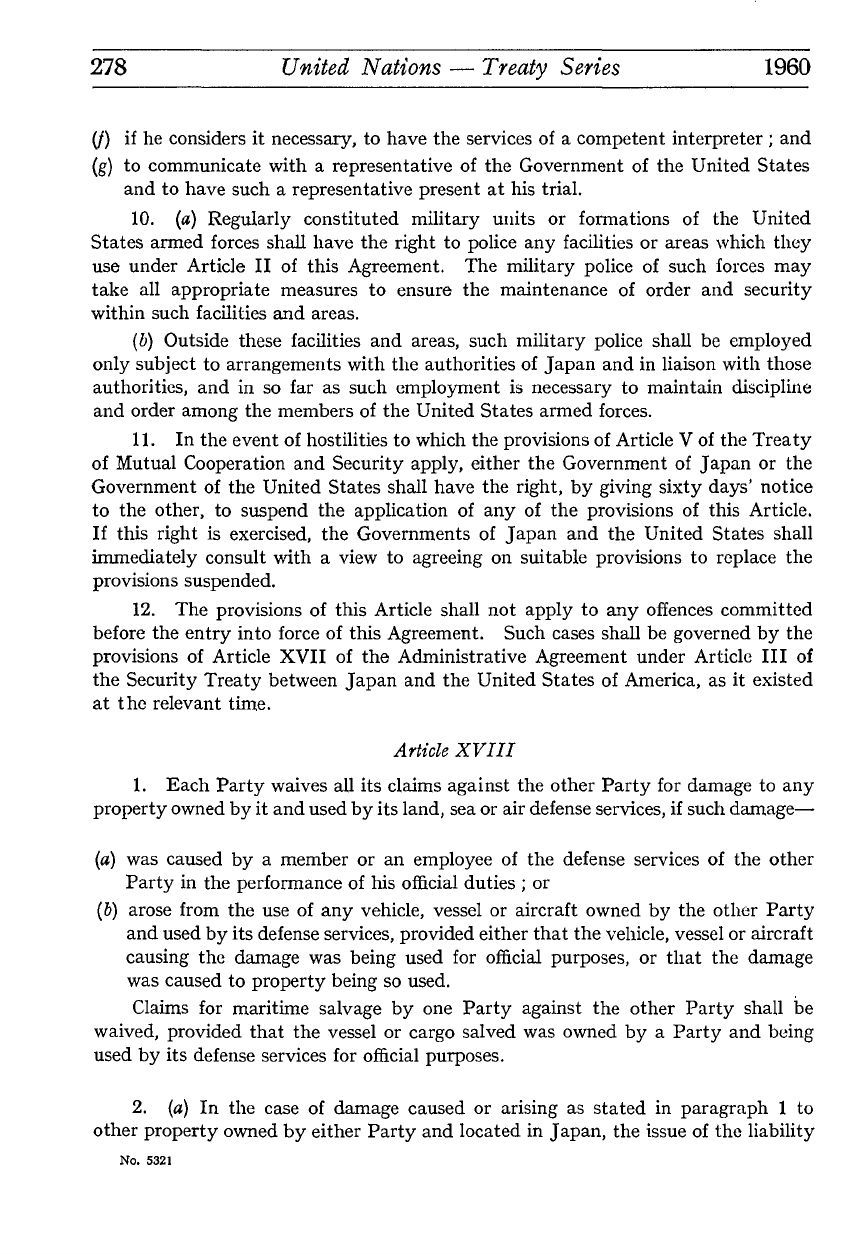
278
United
Nations
—
Treaty
Series
1960
(/)
if
he
considers
it
necessary,
to
have
the
services
of
a
competent
interpreter
;
and
(g)
to
communicate
with
a
representative
of
the
Government
of
the
United
States
and
to
have
such
a
representative
present
at
his
trial.
10.
(a)
Regularly
constituted
military
units
or
formations
of
the
United
States
armed
forces
shall
have
the
right
to
police
any
facilities
or
areas
which
they
use
under
Article
II
of
this
Agreement.
The
military
police
of
such
forces
may
take
all
appropriate
measures
to
ensure
the
maintenance
of
order
and
security
within
such
facilities
and
areas.
(b)
Outside
these
facilities
and
areas, such
military
police
shall
be
employed
only
subject
to
arrangements
with
the
authorities
of
Japan
and
in
liaison
with
those
authorities,
and
in
so
far
as
such
employment
is
necessary
to
maintain
discipline
and
order
among
the
members
of
the
United
States
armed
forces.
11.
In
the
event
of
hostilities
to
which
the
provisions
of
Article
V
of
the
Treaty
of
Mutual
Cooperation
and
Security
apply,
either
the
Government
of
Japan
or
the
Government
of
the
United
States
shall
have
the
right,
by
giving
sixty days' notice
to
the
other,
to
suspend
the
application
of
any
of
the
provisions
of
this
Article.
If
this
right
is
exercised,
the
Governments
of
Japan
and the
United
States
shall
immediately
consult
with
a
view
to
agreeing
on
suitable
provisions
to
replace
the
provisions
suspended.
12.
The
provisions
of
this
Article
shall
not
apply
to
any
offences
committed
before
the
entry
into
force
of
this
Agreement.
Such
cases
shall be
governed
by
the
provisions
of
Article
XVII
of
the
Administrative
Agreement
under
Article
III
of
the
Security
Treaty
between
Japan
and
the
United States
of
America,
as
it
existed
at
the
relevant
time.
Article
XVIII
1.
Each
Party
waives
all
its
claims
against
the
other
Party
for
damage
to
any
property
owned
by it
and
used
by
its
land,
sea
or
air
defense
services,
if
such
damage
(a)
was
caused
by
a
member
or
an
employee
of
the
defense services
of
the
other
Party
in
the
performance
of
his
official
duties
;
or
(&)
arose from
the
use
of
any
vehicle,
vessel
or
aircraft
owned
by
the
other
Party
and
used
by
its
defense
services,
provided
either
that
the
vehicle,
vessel
or
aircraft
causing
the
damage
was
being
used
for
official
purposes,
or
that
the
damage
was
caused
to
property
being
so
used.
Claims
for
maritime
salvage
by
one
Party
against
the
other
Party
shall be
waived,
provided
that
the
vessel
or
cargo
salved
was
owned
by
a
Party
and
being
used
by
its
defense services
for
official
purposes.
2.
(a)
In
the
case
of
damage
caused
or
arising
as
stated
in
paragraph
1
to
other
property
owned
by
either
Party
and
located
in
Japan,
the
issue
of
the
liability
No.
5321
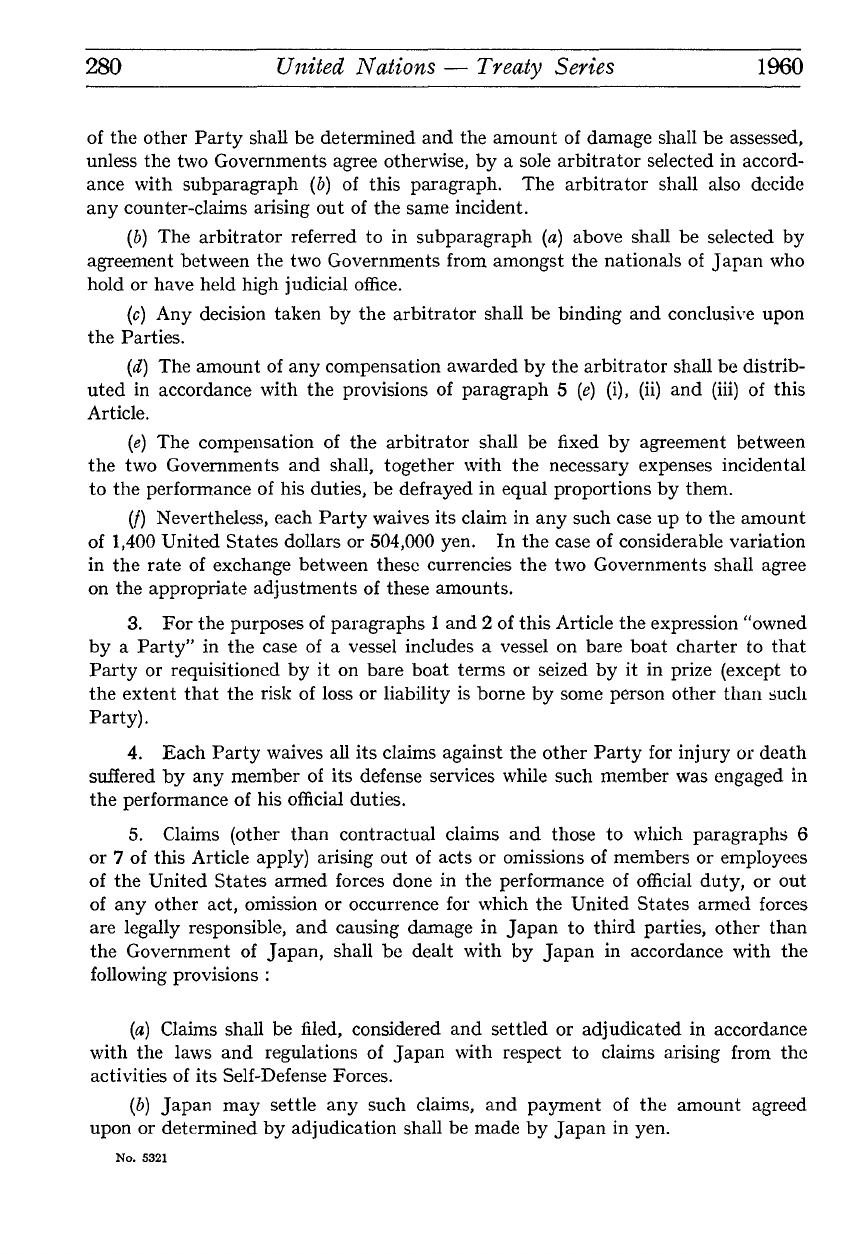
280
United
Nations
—
Treaty
Series
1960
of
the
other
Party
shall
be
determined
and
the
amount
of
damage
shall
be
assessed,
unless
the
two
Governments
agree
otherwise,
by
a
sole
arbitrator
selected
in
accord
ance
with
subparagraph
(o)
of
this paragraph.
The
arbitrator
shall
also
decide
any
counter-claims
arising
out
of
the
same
incident.
(6)
The
arbitrator
referred
to
in
subparagraph
(a)
above
shall
be
selected
by
agreement
between
the
two
Governments
from
amongst
the
nationals
of
Japan
who
hold
or
have
held
high
judicial
office.
(c)
Any
decision
taken
by the
arbitrator
shall
be
binding
and
conclusive
upon
the
Parties.
(d)
The
amount
of
any
compensation
awarded
by the
arbitrator
shall
be
distrib
uted
in
accordance
with
the
provisions
of
paragraph
5
(e)
(i),
(ii)
and
(iii)
of
this
Article.
(e)
The
compensation
of
the
arbitrator
shall
be
fixed
by
agreement
between
the
two
Governments
and
shall,
together
with
the
necessary
expenses
incidental
to the
performance
of
his
duties,
be
defrayed
in
equal
proportions
by
them.
(/)
Nevertheless,
each
Party
waives
its
claim
in
any
such
case
up
to
the
amount
of
1,400
United
States
dollars
or
504,000
yen.
In
the
case
of
considerable
variation
in
the
rate
of
exchange
between
these
currencies
the
two
Governments
shall
agree
on
the
appropriate
adjustments
of
these
amounts.
3.
For
the
purposes
of
paragraphs
1
and
2
of
this
Article
the
expression
"owned
by
a
Party"
in
the
case
of
a
vessel
includes
a
vessel
on
bare
boat
charter
to
that
Party
or
requisitioned
by
it
on
bare boat
terms
or
seized
by
it
in
prize
(except
to
the
extent
that
the
risk
of
loss
or
liability
is
borne
by
some
person
other
than
such
Party).
4.
Each
Party
waives
all
its
claims
against
the
other
Party
for
injury
or
death
suffered
by
any
member
of
its
defense
services
while
such
member
was
engaged
in
the
performance
of
his
official
duties.
5.
Claims
(other
than
contractual
claims
and
those
to
which
paragraphs
6
or
7
of
this
Article
apply)
arising
out
of
acts
or omissions
of
members
or
employees
of
the
United
States
armed
forces
done
in
the
performance
of
official
duty,
or
out
of
any other
act,
omission
or
occurrence
for
which
the
United
States
armed
forces
are
legally
responsible,
and
causing
damage
in
Japan
to
third
parties,
other
than
the
Government
of
Japan,
shall be
dealt
with
by
Japan
in
accordance
with
the
following
provisions
:
(a)
Claims
shall
be
filed,
considered
and
settled
or
adjudicated
in
accordance
with
the
laws
and
regulations
of
Japan
with
respect
to
claims
arising
from
the
activities
of
its
Self-Defense
Forces.
(b)
Japan
may
settle
any
such
claims,
and
payment
of
the
amount
agreed
upon
or
determined
by
adjudication
shall
be
made
by
Japan
in
yen.
No.
5321
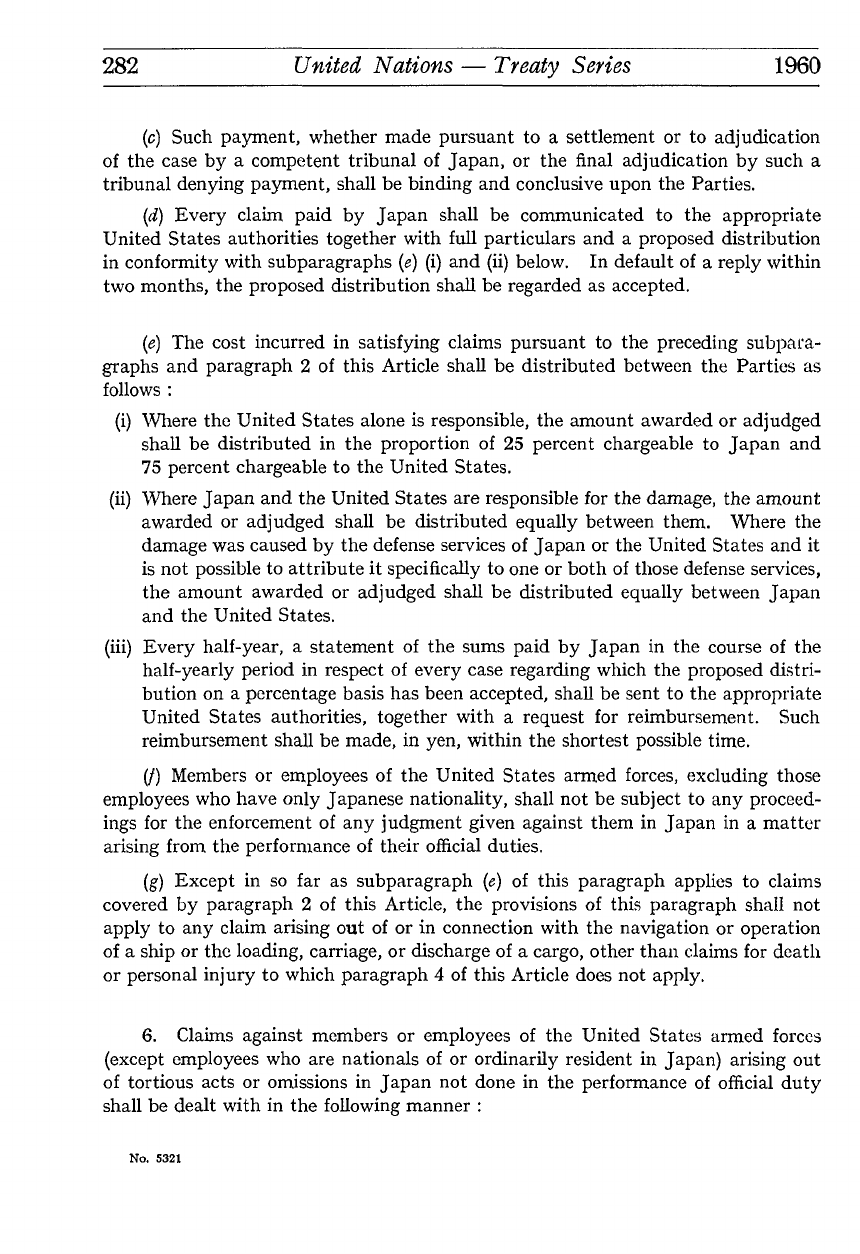
282
United
Nations
—
Treaty
Series
1960
(c)
Such
payment,
whether
made
pursuant
to
a
settlement
or
to
adjudication
of
the
case
by
a
competent
tribunal
of
Japan,
or
the
final
adjudication
by
such
a
tribunal
denying
payment,
shall
be
binding
and
conclusive
upon
the
Parties.
(d)
Every
claim
paid
by
Japan
shall be
communicated
to
the
appropriate
United
States
authorities
together
with
full
particulars
and
a
proposed
distribution
in
conformity
with
subparagraphs
(e)
(i)
and
(ii)
below.
In
default
of
a
reply
within
two
months,
the
proposed
distribution
shall be
regarded
as
accepted.
(e)
The
cost
incurred
in
satisfying
claims
pursuant
to
the
preceding
subpara
graphs
and
paragraph
2
of
this
Article
shall
be
distributed
between
the
Parties
as
follows
:
(i)
Where
the
United
States
alone
is
responsible,
the
amount
awarded
or
adjudged
shall
be
distributed
in
the
proportion
of
25
percent
chargeable
to
Japan
and
75
percent
chargeable
to
the
United
States.
(ii)
Where
Japan
and
the
United
States
are
responsible
for
the
damage,
the
amount
awarded
or
adjudged
shall
be
distributed
equally
between
them. Where
the
damage
was
caused
by the
defense services
of
Japan
or
the
United
States
and
it
is
not
possible
to
attribute
it
specifically
to
one
or
both
of
those
defense
services,
the
amount
awarded
or
adjudged
shall be
distributed
equally
between
Japan
and
the
United
States.
(iii)
Every
half-year,
a
statement
of
the
sums
paid
by
Japan
in
the
course
of
the
half-yearly
period
in
respect
of
every
case
regarding
which
the
proposed
distri
bution
on
a
percentage
basis
has
been
accepted,
shall
be
sent
to the
appropriate
United
States
authorities,
together
with
a
request
for
reimbursement.
Such
reimbursement
shall
be
made,
in
yen,
within
the
shortest
possible
time.
(/)
Members
or
employees
of
the
United
States
armed
forces,
excluding those
employees
who
have
only
Japanese
nationality,
shall
not
be subject
to
any
proceed
ings
for
the
enforcement
of
any
judgment
given
against
them
in
Japan
in
a
matter
arising
from
the
performance
of
their
official
duties.
(g)
Except
in
so
far
as
subparagraph
(e)
of
this
paragraph
applies
to
claims
covered
by
paragraph
2
of
this
Article,
the
provisions
of
this
paragraph
shall
not
apply
to
any
claim
arising
out
of
or
in
connection
with
the
navigation
or
operation
of
a
ship
or
the
loading,
carriage,
or
discharge
of
a
cargo,
other
than
claims
for
death
or
personal
injury
to
which
paragraph
4
of
this
Article
does
not
apply.
6.
Claims
against
members
or
employees
of
the
United
States
armed
forces
(except
employees
who
are
nationals
of
or
ordinarily
resident
in
Japan)
arising
out
of
tortious
acts
or
omissions
in
Japan
not
done
in
the
performance
of
official
duty
shall
be
dealt
with
in
the
following
manner
:
No.
5321
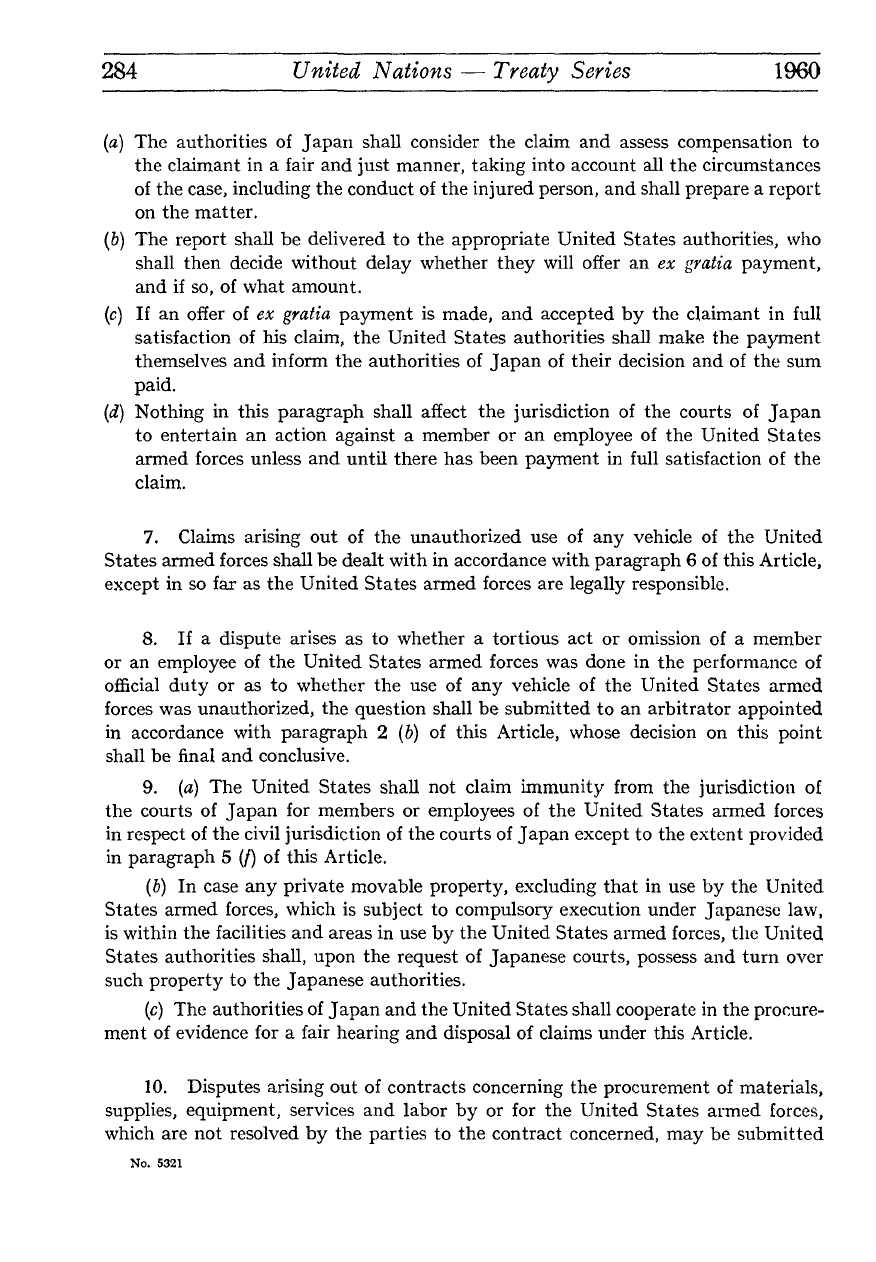
284
United
Nations
Treaty
Series
1960
(a)
The
authorities
of
Japan
shall
consider
the
claim
and
assess
compensation
to
the
claimant
in
a
fair
and
just
manner,
taking
into
account
all
the
circumstances
of
the
case,
including
the
conduct
of
the
injured
person,
and
shall
prepare
a
report
on
the
matter.
(b)
The
report
shall
be
delivered
to
the
appropriate
United
States
authorities,
who
shall
then
decide
without
delay
whether
they
will
offer
an
ex
gratia
payment,
and
if
so,
of
what
amount.
(c)
If
an
offer
of
ex
gratia
payment
is
made,
and
accepted
by
the
claimant
in
full
satisfaction
of
his
claim,
the
United
States
authorities
shall
make
the
payment
themselves
and
inform
the
authorities
of
Japan
of
their
decision
and
of
the
sum
paid.
(d)
Nothing
in
this
paragraph
shall
affect
the
jurisdiction
of
the
courts
of
Japan
to
entertain
an
action
against
a
member
or
an
employee
of
the
United
States
armed
forces
unless
and
until
there
has
been
payment
in
full
satisfaction
of
the
claim.
7.
Claims
arising
out
of
the
unauthorized
use
of
any
vehicle
of
the
United
States
armed
forces
shall
be
dealt
with
in
accordance
with
paragraph
6
of
this
Article,
except
in
so
far
as
the
United
States
armed
forces
are
legally
responsible.
8.
If
a
dispute
arises
as
to
whether
a
tortious
act
or
omission
of
a
member
or
an
employee
of
the
United
States
armed
forces
was
done
in
the
performance
of
official
duty
or
as
to
whether
the
use
of
any
vehicle
of
the
United
States
armed
forces
was
unauthorized,
the
question
shall
be
submitted
to
an
arbitrator
appointed
in
accordance
with
paragraph
2
(b)
of
this
Article,
whose decision
on
this
point
shall be
final
and
conclusive.
9.
(a)
The
United
States
shall
not
claim
immunity
from
the
jurisdiction
of
the
courts
of
Japan
for
members
or
employees
of
the
United
States
armed
forces
in
respect
of
the
civil
jurisdiction
of
the
courts
of
Japan
except
to
the
extent
provided
in
paragraph
5 (/)
of
this
Article.
(b)
In
case
any
private
movable
property,
excluding
that
in
use
by
the
United
States
armed
forces,
which
is
subject
to
compulsory
execution
under
Japanese
law,
is
within
the
facilities
and
areas
in
use
by the
United
States
armed
forces,
the
United
States
authorities
shall,
upon
the
request
of
Japanese
courts,
possess
and
turn
over
such
property
to
the
Japanese
authorities.
(c)
The
authorities
of
Japan
and
the
United
States
shall
cooperate
in
the
procure
ment
of
evidence
for
a
fair
hearing
and
disposal
of
claims
under
this
Article.
10.
Disputes
arising
out
of
contracts
concerning
the
procurement
of
materials,
supplies,
equipment,
services
and labor
by
or for
the
United
States
armed
forces,
which
are
not
resolved
by the
parties
to the contract
concerned,
may
be
submitted
No.
5321

286
United
Nations
—
Treaty
Series
1960
to
the
Joint
Committee
for
conciliation,
provided
that
the
provisions
of
this
para
graph
shall
not
prejudice
any
right
which
the
parties
to
the contract
may
have
to
file
a
civil
suit.
11.
The
term
"defense
services"
used
in
this
Article
is
understood
to
mean
for
Japan
its
Self-Defense
Forces
and
for
the
United States
its
armed
forces.
12.
Paragraphs
2
and
5
of
this
Article shall
apply
only
to
claims
arising
incident
to
non-combat
activities.
13.
The
provisions
of
this
Article
shall
not
apply
to
any
claims
which
arose
before
the
entry
into
force
of
this
Agreement.
Such
claims
shall
be
dealt
with
by
the
provisions
of
Article
XVIII
of
the
Administrative
Agreement
under
Article
III
of
the
Security
Treaty
between
Japan
and
the
United
States
of
America.
Article
XIX
1.
Members
of
the
United
States
armed
forces,
the
civilian
component,
and
their
dependents,
shall
be
subject
to the
foreign
exchange
controls
of
the
Government
of
Japan.
2.
The
preceding
paragraph
shall
not
be
construed to
preclude
the
transmission
into
or
outside
of
Japan
of
United States
dollars
or
dollar
instruments
representing
the
official
funds
of
the
United
States
or
realized
as
a
result
of
service or
employment
in
connection
with
this
Agreement
by
members
of
the
United
States
armed
forces
and
the
civilian
component,
or
realized
by
such
persons
and
their
dependents
from
sources
outside
of
Japan.
3.
The
United States
authorities
shall
take
suitable
measures
to
preclude
the
abuse
of
the
privileges
stipulated
in
the
preceding
paragraph
or
circumvention
of
the
Japanese
foreign
exchange
controls.
Article
XX
1.
(a)
United
States
military
payment
certificates
denominated
in
dollars
may
be
used
by
persons
authorized
by
the
United
States
for
internal
transactions
within
the
facilities
and
areas
in
use
by
the
United States
armed
forces.
The
Gov
ernment
of
the
United
States
will
take appropriate
action
to
insure
that
authorized
personnel
are
prohibited
from
engaging
in
transactions
involving
military
payment
certificates except
as
authorized
by
United
States
regulations.
The
Government
of
Japan
will
take
necessary
action
to
prohibit
unauthorized
persons
from
engaging
in
transactions
involving
military
payment
certificates
and
with
the
aid
of
United
States
authorities
will
undertake
to
apprehend
and
punish
any
person
or
persons
under
its
jurisdiction
involved
in
the
counterfeiting
or
uttering
of
counterfeit
military
payment
certificates.
No.
5321
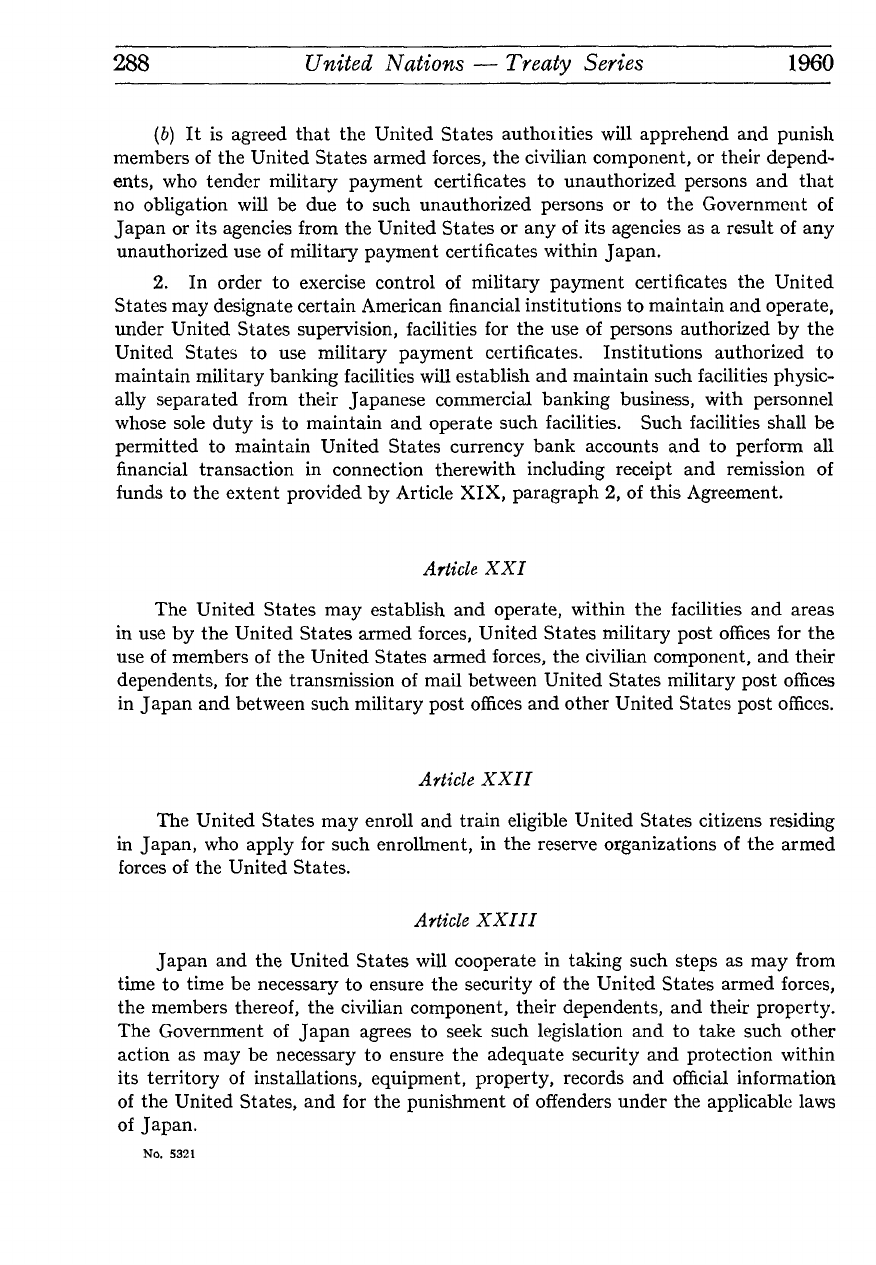
288
United
Nations
—
Treaty
Series
1960
(b)
It
is
agreed
that
the
United
States
authorities
will
apprehend
and
punish
members
of
the
United
States
armed
forces,
the
civilian
component,
or
their
depend
ents,
who
tender
military
payment
certificates
to
unauthorized
persons
and
that
no
obligation
will
be
due
to
such
unauthorized
persons
or
to
the
Government
of
Japan
or
its
agencies
from
the
United
States
or
any
of
its
agencies
as
a
result
of
any
unauthorized
use
of
military
payment
certificates
within
Japan.
2.
In
order
to
exercise
control
of
military
payment
certificates
the
United
States
may
designate
certain
American financial
institutions
to
maintain
and
operate,
under
United
States
supervision, facilities
for
the
use
of
persons
authorized
by the
United States
to
use
military
payment
certificates.
Institutions
authorized
to
maintain
military
banking
facilities
will
establish
and
maintain
such
facilities
physic
ally
separated
from
their
Japanese
commercial
banking
business,
with
personnel
whose
sole
duty
is
to
maintain
and
operate
such
facilities. Such
facilities
shall
be
permitted
to
maintain
United
States
currency
bank
accounts
and
to
perform
all
financial
transaction
in
connection
therewith
including
receipt
and
remission
of
funds
to
the extent
provided
by
Article
XIX,
paragraph
2,
of
this
Agreement.
Article
XXI
The
United
States
may
establish
and
operate,
within
the
facilities
and
areas
in
use
by
the
United
States
armed
forces,
United States
military
post
offices
for
the
use
of
members
of
the
United
States
armed
forces,
the
civilian
component,
and
their
dependents,
for
the
transmission
of
mail
between
United
States
military
post
offices
in
Japan
and
between
such
military
post
offices
and other
United
States
post
offices.
Article
XXII
The
United
States
may
enroll
and
train
eligible
United
States
citizens residing
in
Japan,
who
apply
for
such
enrollment,
in
the
reserve
organizations
of
the
armed
forces
of
the
United
States.
Article
XXIII
Japan
and
the
United
States
will
cooperate
in
taking
such
steps
as
may
from
time
to
time
be
necessary
to
ensure
the security
of
the
United
States
armed
forces,
the
members thereof,
the
civilian
component,
their
dependents,
and
their
property.
The
Government
of
Japan
agrees
to
seek
such
legislation
and
to
take
such
other
action
as
may
be
necessary
to
ensure
the
adequate
security
and
protection
within
its
territory
of
installations, equipment,
property,
records
and
official
information
of
the
United
States, and
for
the
punishment
of
offenders
under
the
applicable
laws
of
Japan.
No.
5321
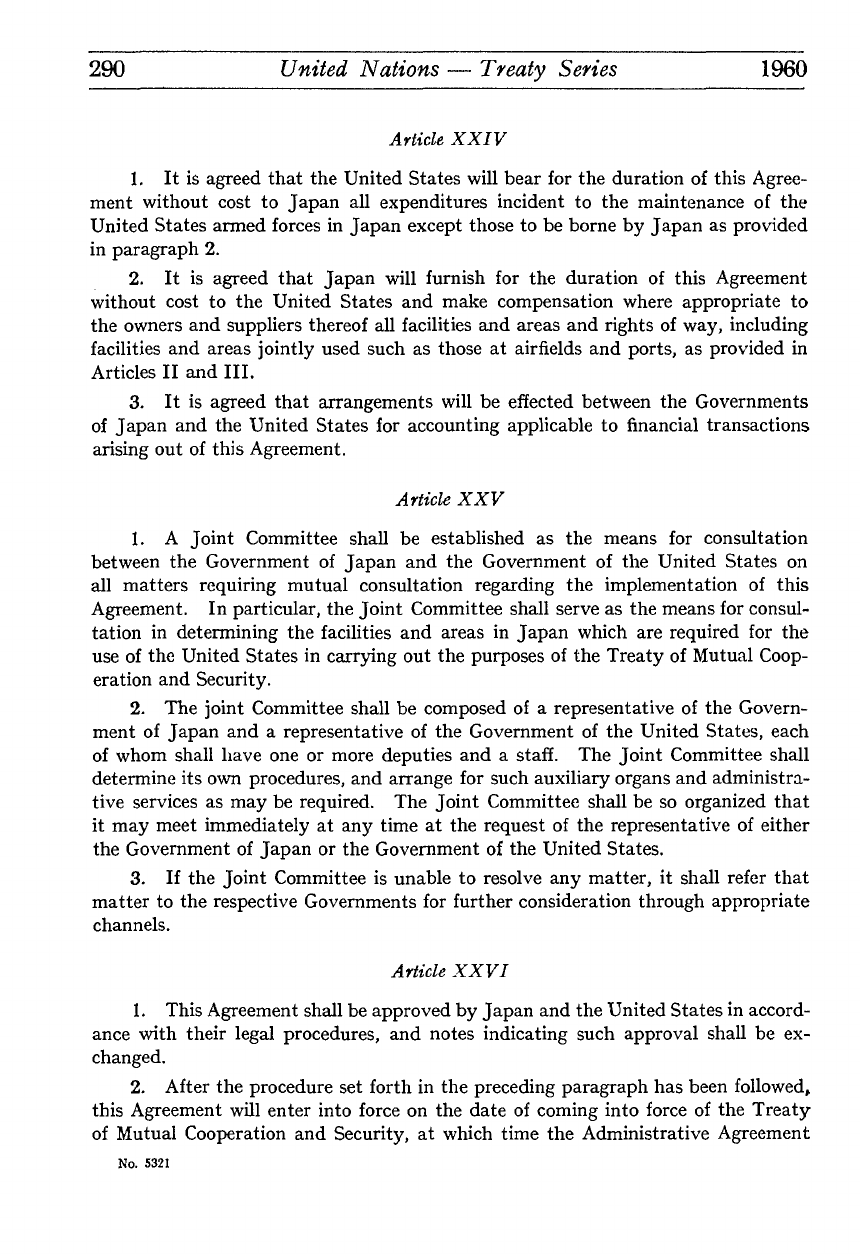
290
United
Nations
—
Treaty
Series
I960
Article
XXIV
1.
It
is
agreed
that
the
United
States
will
bear
for
the
duration
of
this
Agree
ment
without
cost
to
Japan
all
expenditures
incident
to
the
maintenance
of
the
United
States
armed
forces
in
Japan
except
those
to
be
borne
by
Japan
as
provided
in
paragraph
2.
2.
It
is
agreed
that
Japan
will
furnish
for
the
duration
of
this
Agreement
without
cost
to
the
United
States
and
make
compensation
where
appropriate
to
the
owners
and
suppliers
thereof
all
facilities
and
areas
and
rights
of
way,
including
facilities
and
areas
jointly
used
such as
those
at
airfields
and
ports,
as
provided
in
Articles
II
and
III.
3.
It
is
agreed
that
arrangements
will
be
effected
between
the
Governments
of
Japan
and
the
United
States
for
accounting
applicable
to
financial
transactions
arising
out
of
this
Agreement.
Article
XXV
1.
A
Joint
Committee
shall
be
established
as
the
means
for
consultation
between
the
Government
of
Japan
and
the
Government
of
the
United
States
on
all
matters
requiring
mutual
consultation
regarding
the
implementation
of
this
Agreement.
In
particular,
the
Joint
Committee
shall
serve
as
the
means
for
consul
tation
in
determining
the
facilities
and
areas
in
Japan
which
are
required
for
the
use
of
the
United
States
in
carrying
out
the
purposes
of
the
Treaty
of
Mutual
Coop
eration
and
Security.
2.
The
joint
Committee
shall be
composed
of
a
representative
of
the
Govern
ment
of
Japan
and
a
representative
of
the
Government
of
the
United
States,
each
of
whom
shall
have
one
or
more
deputies
and
a
staff.
The
Joint
Committee
shall
determine
its
own
procedures,
and
arrange
for
such
auxiliary
organs
and
administra
tive
services
as
may
be
required.
The
Joint
Committee
shall
be
so
organized
that
it
may
meet
immediately
at
any
time
at
the
request
of
the
representative
of
either
the
Government
of
Japan
or
the
Government
of
the
United
States.
3.
If
the
Joint
Committee
is
unable
to
resolve
any
matter,
it
shall
refer
that
matter
to
the
respective
Governments
for
further
consideration
through
appropriate
channels.
Article
XXVI
1.
This
Agreement
shall
be
approved
by
Japan
and
the
United
States
in
accord
ance
with
their
legal
procedures,
and
notes
indicating
such
approval
shall
be ex
changed.
2.
After
the
procedure
set
forth
in
the
preceding
paragraph
has
been
followed,
this
Agreement
will
enter
into
force
on
the date
of
coming
into
force
of
the
Treaty
of
Mutual
Cooperation
and
Security,
at
which
time
the
Administrative
Agreement
No.
5321
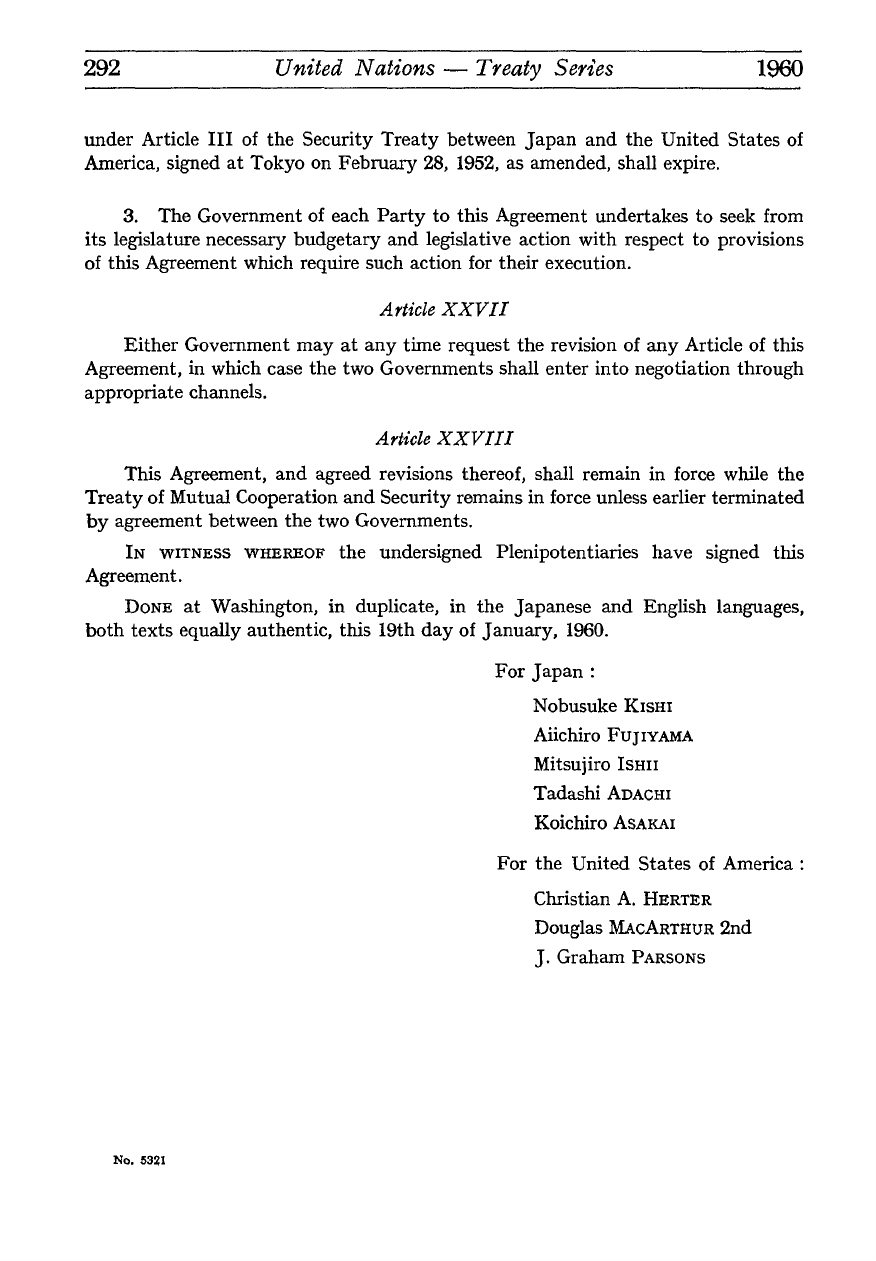
292
United
Nations
—
Treaty
Series I960
under
Article
III
of
the
Security
Treaty
between
Japan
and the
United States
of
America,
signed
at
Tokyo
on
February
28,
1952,
as
amended,
shall
expire.
3.
The
Government
of
each
Party
to
this
Agreement
undertakes
to
seek
from
its
legislature necessary
budgetary
and
legislative
action
with
respect
to
provisions
of
this
Agreement
which
require
such
action
for
their
execution.
Article
XXVII
Either
Government
may
at
any
time
request
the
revision
of
any
Article
of
this
Agreement,
in
which
case
the
two
Governments
shall
enter
into
negotiation
through
appropriate
channels.
Article
XXVIII
This
Agreement,
and
agreed
revisions
thereof,
shall
remain
in
force
while
the
Treaty
of
Mutual
Cooperation
and
Security
remains
in
force
unless
earlier
terminated
by
agreement
between
the
two
Governments.
IN
WITNESS
WHEREOF
the
undersigned
Plenipotentiaries
have
signed
this
Agreement.
DONE
at
Washington,
in
duplicate,
in
the
Japanese
and
English
languages,
both
texts
equally
authentic,
this
19th
day
of
January,
1960.
For
Japan
:
Nobusuke
KISHI
Aiichiro
FUJIYAMA
Mitsujiro
ISHII
Tadashi
ADACHI
Koichiro
ASAKAI
For
the
United
States
of
America
:
Christian
A.
HERTER
Douglas
MAcARTHUR
2nd
J.
Graham
PARSONS
Ho.
5321
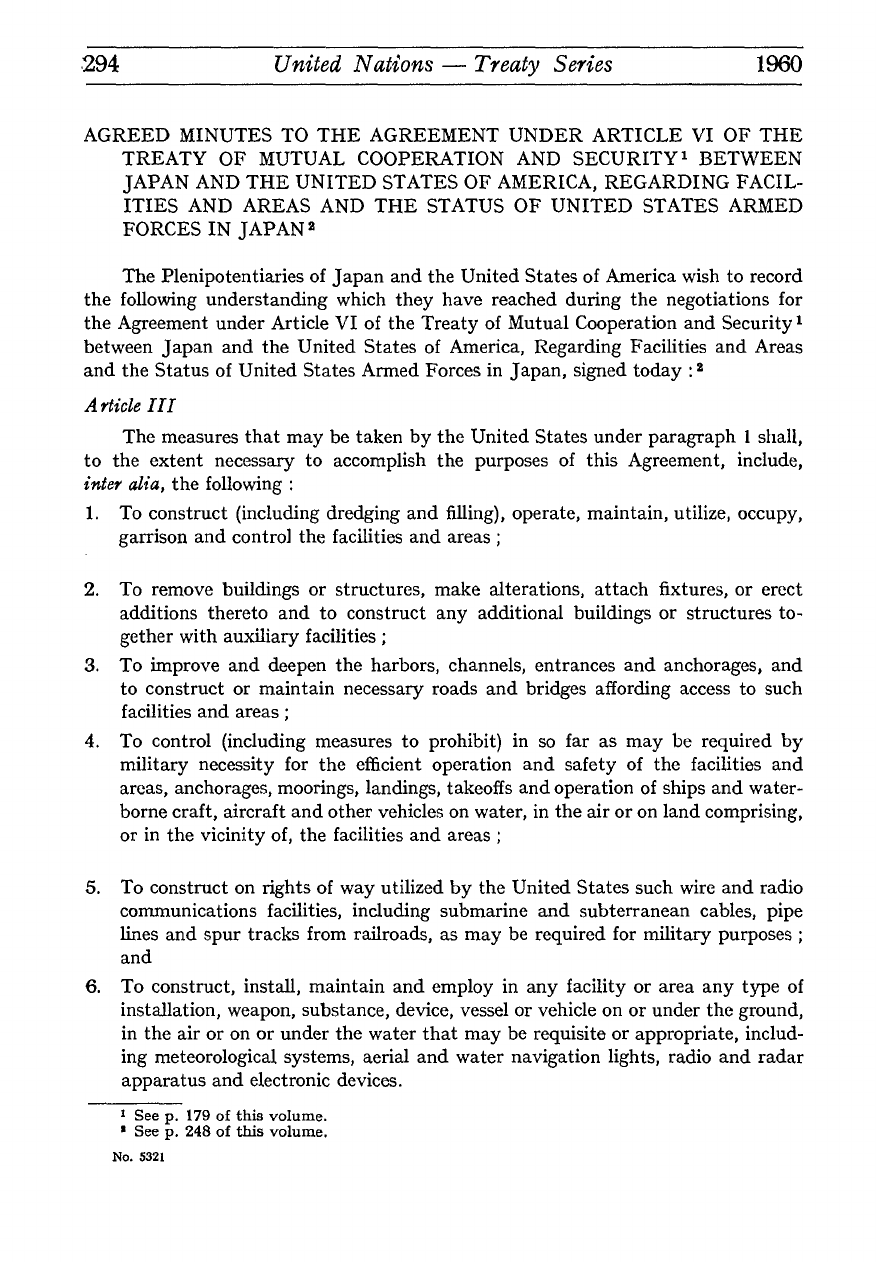
294 United
Nations
Treaty
Series
1960
AGREED
MINUTES
TO
THE
AGREEMENT
UNDER
ARTICLE
VI
OF
THE
TREATY
OF
MUTUAL
COOPERATION
AND
SECURITY
1
BETWEEN
JAPAN
AND
THE
UNITED
STATES
OF
AMERICA,
REGARDING
FACIL
ITIES
AND
AREAS
AND
THE
STATUS
OF
UNITED
STATES
ARMED
FORCES
IN
JAPAN
2
The
Plenipotentiaries
of
Japan
and
the
United
States
of
America
wish
to
record
the
following
understanding
which
they
have
reached
during
the
negotiations
for
the
Agreement
under
Article
VI
of
the
Treaty
of
Mutual
Cooperation
and
Security
1
between
Japan
and
the
United States
of
America,
Regarding
Facilities
and
Areas
and
the
Status
of
United
States
Armed
Forces
in
Japan,
signed
today
:
2
Article
III
The
measures
that
may
be
taken
by the
United
States
under
paragraph
1
shall,
to the
extent
necessary
to
accomplish
the
purposes
of
this
Agreement,
include,
inter
alia,
the
following
:
1.
To
construct
(including
dredging
and
filling),
operate,
maintain,
utilize,
occupy,
garrison
and
control
the
facilities
and
areas
;
2.
To
remove
buildings
or
structures,
make
alterations,
attach
fixtures,
or
erect
additions
thereto
and
to
construct
any
additional
buildings
or
structures
to
gether
with
auxiliary
facilities
;
3.
To
improve
and
deepen
the
harbors,
channels,
entrances
and
anchorages,
and
to
construct
or
maintain
necessary
roads
and
bridges
affording
access
to
such
facilities
and
areas
;
4.
To
control
(including
measures
to
prohibit)
in
so
far
as
may
be
required
by
military
necessity
for
the
efficient
operation
and
safety
of
the
facilities
and
areas,
anchorages,
moorings,
landings,
takeoffs
and
operation
of
ships
and
water-
borne
craft,
aircraft
and
other
vehicles
on
water,
in
the
air
or
on
land
comprising,
or
in
the
vicinity
of,
the
facilities
and
areas
;
5.
To
construct
on
rights
of
way
utilized
by
the
United
States
such
wire
and
radio
communications
facilities,
including
submarine
and
subterranean
cables,
pipe
Unes
and
spur
tracks
from
railroads,
as
may
be
required
for
military
purposes
;
and
6.
To
construct,
install,
maintain
and
employ
in
any
facility
or
area
any
type
of
installation,
weapon,
substance,
device,
vessel
or
vehicle
on
or
under
the
ground,
in
the
air
or
on
or
under
the
water
that
may
be
requisite
or
appropriate,
includ
ing
meteorological
systems,
aerial
and
water
navigation
lights,
radio
and
radar
apparatus
and
electronic
devices.
1
See
p.
179
of
this
volume.
1
See
p.
248
of
this
volume.
No.
5321

296
United
Nations
—
Treaty
Series
1960
Article
V
1.
"United
States
and
foreign
vessels...
operated
by,
for,
or
under
the
control
of
the
United
States
for
official
purposes"
mean
United
States
public
vessels
and
chartered
vessels
(bare
boat
charter,
voyage
charter
and
time
charter).
Space
charter
is
not
included.
Commercial
cargo
and
private
passengers
are
carried
by
them
only
in
exceptional
cases.
2.
The
Japanese
ports
mentioned
herein
will
ordinarily
mean
"open
ports".
3.
The
exemption
from
making
"appropriate
notification"
will
be
applicable
only
to
exceptional
cases
where
such
is
required
for
security
of
the
United
States
armed
forces
or
similar
reasons.
4.
The
laws
and
regulations
of
Japan
will
be
applicable
except
as
specifically
provided
otherwise
in
this
Article.
Article
VII
The
problem
of
telecommunications
rates
applicable
to
the
United
States
armed
forces
will
continue
to
be
studied
in
the
light
of,
inter
alia,
the statements
concerning
Article
VII
recorded
in
the
official
minutes
of
the
Tenth
Joint
Meeting
for
the
Ne
gotiation
of
the
Administrative
Agreement
signed
on
February
28,
1952,
1
which
are
hereby
incorporated
by
reference.
Article
IX
The
Government
of
Japan
will
be
notified
at
regular
intervals,
in
accordance
with
procedures
to
be
agreed
between
the
two
Governments,
of
numbers
and
cat
egories of
persons
entering
and
departing.
Article
XI
1.
The
quantity
of
goods
imported
under
paragraph
2
by
the
organizations
provided
for
in
Article
XV
for
the
use
of
the
members
of
the
United
States
armed
forces,
the
civilian
component,
and
their
dependents
shall
be
limited
to
the
extent
reasonably
required
for such
use.
2.
Paragraph
3
(a)
does
not
require
concurrent
shipment
of
goods
with
travel
of
owner
nor
does
it
require
single
loading
or
shipment.
3.
The
term "military
cargo"
as
used
in
paragraph
5
(c)
is
not
confined
to
arms
and
equipment
but
refers
to
all
cargo
shipped
to the
United
States
armed
forces
on
a
United
States
Government
bill
of
lading,
the
term
"military
cargo"
being
used
to
distinguish
cargo
shipped
to the
United
States
armed
forces
from
cargo
shipped
to
other
agencies
of
the
United
States
Government.
4.
The
United
States
armed
forces
will
take
every
practicable
measure
to
ensure
that
goods
will
not
be
imported
into
Japan
by
or
for
the
members
of
the
United
1
United
Nations,
Treaty
Series,
Vol.
208,
p.
255
;
Vol. 268,
p.
360
;
Vol.
273,
p.
265
;
Vol. 290,
p.
316
;
Vol. 336,
p.
351
;
Vol.
344,
p.
332,
and
Vol.
368.
No.
5321
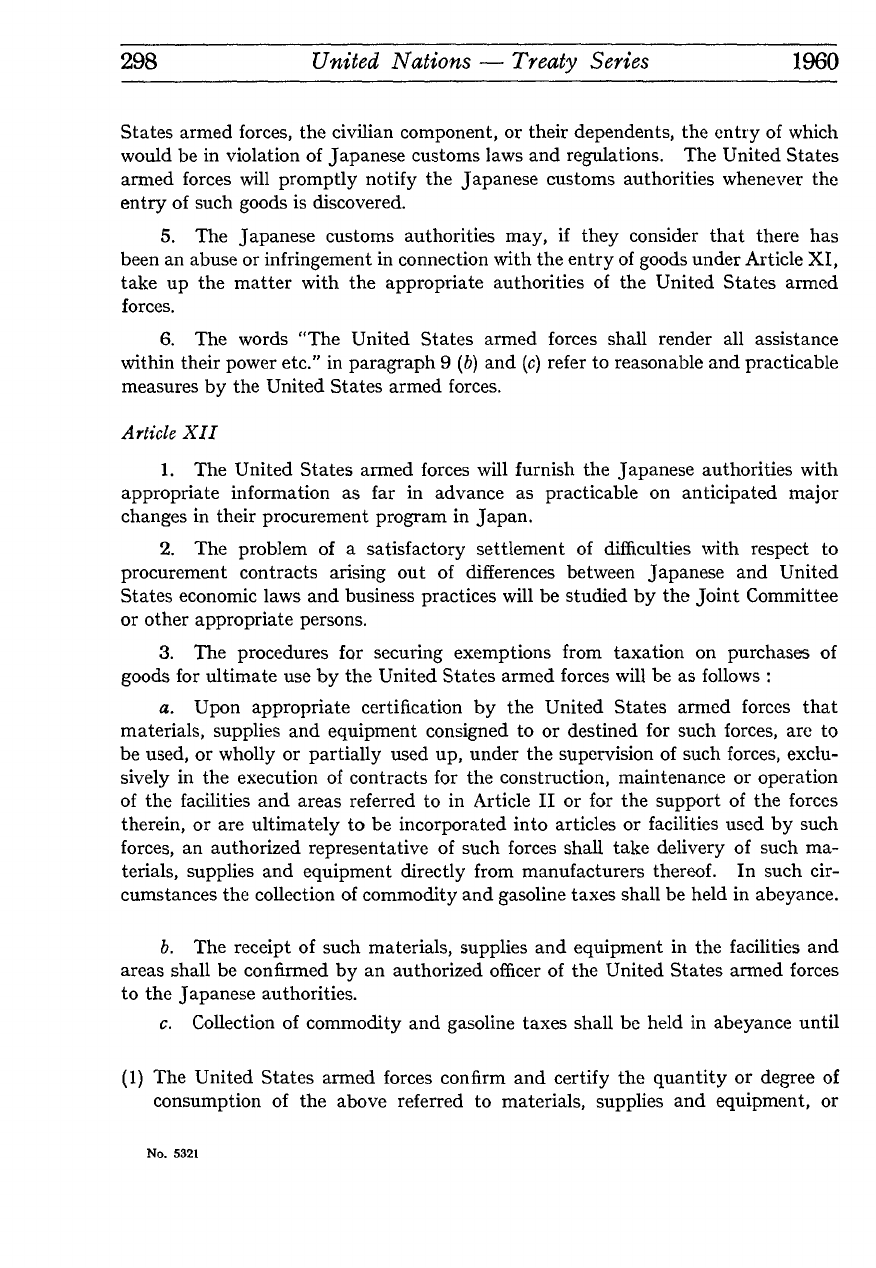
298
United
Nations
—
Treaty
Series
1960
States
armed
forces,
the
civilian
component,
or
their
dependents,
the
entry
of
which
would be in
violation
of
Japanese
customs
laws
and
regulations.
The
United
States
armed
forces
will
promptly
notify
the
Japanese
customs
authorities
whenever
the
entry
of
such
goods
is
discovered.
5.
The
Japanese
customs
authorities
may,
if
they
consider
that
there
has
been
an
abuse
or
infringement
in
connection
with
the
entry
of
goods
under
Article
XI,
take
up
the
matter
with
the
appropriate
authorities
of
the
United States
armed
forces.
6.
The
words
"The
United States
armed
forces
shall
render
all
assistance
within
their
power
etc."
in
paragraph
9
(b)
and
(c)
refer
to
reasonable
and
practicable
measures
by
the
United
States
armed
forces.
Article
XII
1.
The
United
States
armed
forces
will
furnish
the
Japanese
authorities
with
appropriate
information
as
far
in
advance
as
practicable
on
anticipated
major
changes
in
their
procurement
program
in
Japan.
2.
The
problem
of
a
satisfactory
settlement
of
difficulties
with
respect
to
procurement
contracts
arising
out
of
differences
between
Japanese
and
United
States
economic
laws
and
business
practices
will
be
studied
by
the
Joint
Committee
or
other
appropriate
persons.
3.
The
procedures
for
securing
exemptions
from
taxation
on
purchases
of
goods
for
ultimate
use
by
the
United
States
armed
forces
will
be
as
follows
:
a.
Upon
appropriate
certification
by the
United States
armed
forces
that
materials,
supplies
and
equipment
consigned
to
or
destined
for
such
forces,
are
to
be
used,
or
wholly
or
partially
used
up,
under
the
supervision
of
such
forces,
exclu
sively
in
the
execution
of
contracts
for
the
construction,
maintenance
or
operation
of
the
facilities
and
areas referred
to
in
Article
II
or
for
the
support
of
the
forces
therein,
or
are
ultimately
to
be
incorporated
into
articles
or
facilities
used
by
such
forces,
an
authorized
representative
of
such
forces
shall
take
delivery
of
such
ma
terials,
supplies
and
equipment
directly
from
manufacturers
thereof.
In
such
cir
cumstances
the
collection
of
commodity
and
gasoline
taxes
shall be
held
in
abeyance.
b.
The
receipt
of
such
materials,
supplies
and
equipment
in
the
facilities
and
areas
shall
be
confirmed
by
an
authorized
officer
of
the
United
States
armed
forces
to
the
Japanese
authorities.
c.
Collection
of
commodity
and
gasoline
taxes
shall
be
held
in
abeyance
until
(1)
The
United States
armed
forces
confirm
and
certify
the
quantity
or
degree
of
consumption
of
the
above
referred
to
materials,
supplies
and
equipment,
or
No.
5321
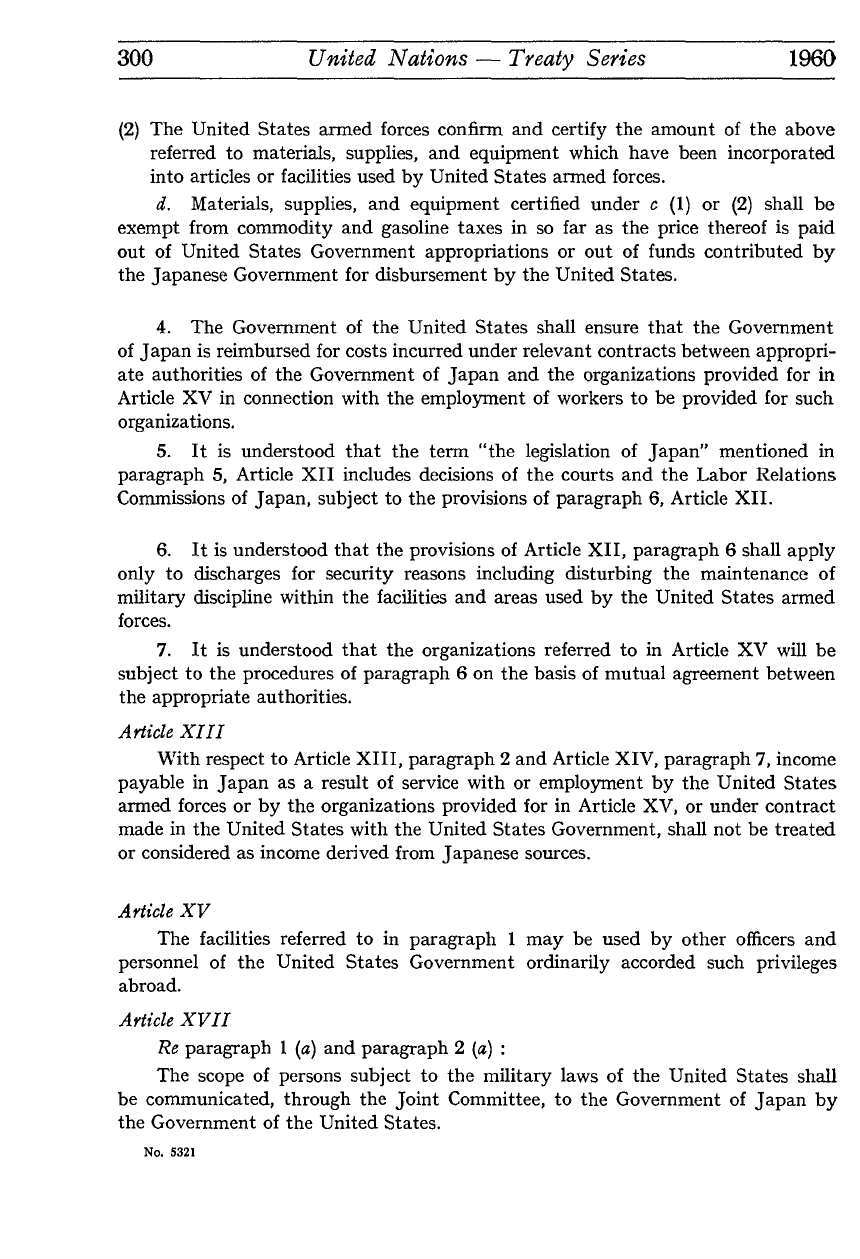
300
United
Nations
—
Treaty
Series
1960
(2)
The
United
States
armed
forces
confirm
and
certify
the
amount
of
the
above
referred
to
materials,
supplies,
and
equipment
which
have
been
incorporated
into
articles
or
facilities
used
by
United
States
armed
forces.
d.
Materials,
supplies,
and
equipment
certified
under
c
(1)
or
(2)
shall
be
exempt
from
commodity
and
gasoline
taxes
in
so
far
as
the
price
thereof
is
paid
out
of
United
States
Government
appropriations
or
out
of
funds
contributed
by
the
Japanese
Government
for
disbursement
by
the
United
States.
4.
The
Government
of
the
United
States
shall
ensure
that
the
Government
of
Japan
is
reimbursed
for
costs
incurred
under
relevant
contracts
between
appropri
ate
authorities
of
the
Government
of
Japan
and
the
organizations
provided
for
in
Article
XV
in
connection
with
the
employment
of
workers
to
be
provided
for
such
organizations.
5.
It
is
understood
that
the
term
"the
legislation
of
Japan"
mentioned
in
paragraph
5,
Article
XII
includes
decisions
of
the
courts
and the
Labor Relations
Commissions
of
Japan,
subject
to
the
provisions
of
paragraph
6,
Article
XII.
6.
It
is
understood
that
the
provisions
of
Article
XII,
paragraph
6
shall
apply
only
to
discharges
for
security
reasons
including
disturbing
the
maintenance
of
military
discipline
within
the
facilities
and
areas
used
by the
United
States
armed
forces.
7.
It
is
understood
that
the
organizations
referred
to
in
Article
XV
will
be
subject
to
the
procedures
of
paragraph
6
on
the
basis
of
mutual
agreement
between
the
appropriate
authorities.
Article
XIII
With
respect
to
Article
XIII,
paragraph
2
and
Article
XIV,
paragraph
7,
income
payable
in
Japan
as
a
result
of
service
with
or
employment
by
the
United
States
armed
forces
or
by
the
organizations
provided
for
in
Article
XV,
or
under
contract
made
in
the
United
States
with
the
United
States
Government,
shall
not
be
treated
or
considered
as
income
derived
from
Japanese
sources.
Article
XV
The
facilities
referred
to
in
paragraph
1
may
be
used
by
other
officers
and
personnel
of
the
United
States
Government
ordinarily
accorded
such
privileges
abroad.
Article
XVII
Re
paragraph
1
(a)
and
paragraph
2
(a)
:
The
scope
of
persons
subject
to the
military
laws
of
the
United
States
shall
be
communicated,
through
the
Joint
Committee,
to
the
Government
of
Japan
by
the
Government
of
the
United
States.
No.
5321
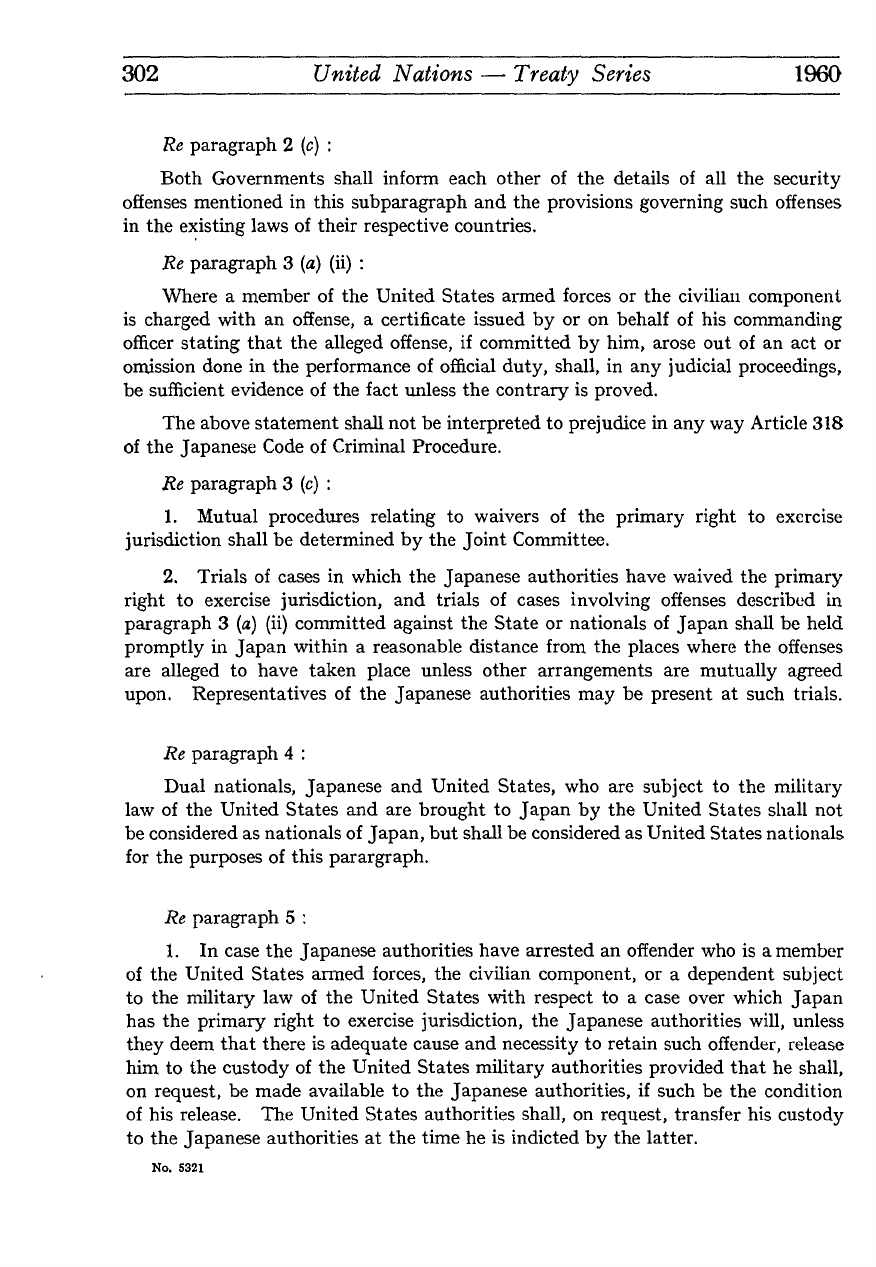
302
United
Nations
—
Treaty
Series
1960
Re
paragraph
2
(c)
:
Both
Governments
shall
inform
each
other
of
the
details
of
all
the
security
offenses
mentioned
in
this
subparagraph
and the
provisions
governing
such
offenses
in
the
existing
laws
of
their
respective
countries.
Re
paragraph
3
(a)
(ii)
:
Where
a
member
of
the
United
States
armed
forces
or
the
civilian
component
is
charged
with
an
offense,
a
certificate
issued
by
or
on
behalf
of
his
commanding
officer
stating
that
the
alleged
offense,
if
committed
by
him,
arose
out
of
an
act
or
omission
done
in
the
performance
of
official
duty,
shall,
in
any
judicial
proceedings,
be
sufficient
evidence
of
the
fact
unless
the
contrary
is
proved.
The
above
statement
shall
not
be
interpreted
to
prejudice
in
any
way
Article
318
of
the
Japanese
Code
of
Criminal
Procedure.
Re
paragraph
3
(c)
:
1.
Mutual
procedures
relating
to
waivers
of
the
primary
right
to
exercise
jurisdiction
shall
be
determined
by
the
Joint
Committee.
2.
Trials
of
cases
in
which
the
Japanese
authorities
have
waived
the
primary
right
to
exercise
jurisdiction,
and
trials
of
cases
involving
offenses
described
in
paragraph
3
(a)
(ii)
committed
against
the State
or
nationals
of
Japan
shall
be
held
promptly
in
Japan
within
a
reasonable
distance
from
the
places
where
the
offenses
are
alleged
to
have
taken
place
unless
other
arrangements
are
mutually
agreed
upon.
Representatives
of
the
Japanese
authorities
may
be
present
at
such
trials.
Re
paragraph
4
:
Dual
nationals,
Japanese
and
United
States,
who
are
subject
to
the
military
law
of
the
United
States
and
are
brought
to
Japan
by
the
United
States
shall
not
be
considered
as
nationals
of
Japan,
but
shall
be
considered
as
United
States
nationals
for
the
purposes
of
this parargraph.
Re
paragraph
5
:
1.
In
case
the
Japanese
authorities
have
arrested
an
offender
who
is
a
member
of
the
United
States
armed
forces,
the
civilian
component,
or
a
dependent
subject
to
the
military
law
of
the
United
States
with
respect
to
a
case
over
which
Japan
has
the
primary
right
to
exercise
jurisdiction,
the
Japanese
authorities
will,
unless
they
deem
that
there
is
adequate
cause
and
necessity
to
retain
such
offender,
release
him
to
the
custody
of
the
United
States
military
authorities
provided
that
he
shall,
on
request,
be made
available
to
the
Japanese
authorities,
if
such
be
the
condition
of
his
release.
The
United
States
authorities
shall,
on
request,
transfer
his
custody
to
the
Japanese
authorities
at
the
time
he
is
indicted
by the
latter.
No.
5321
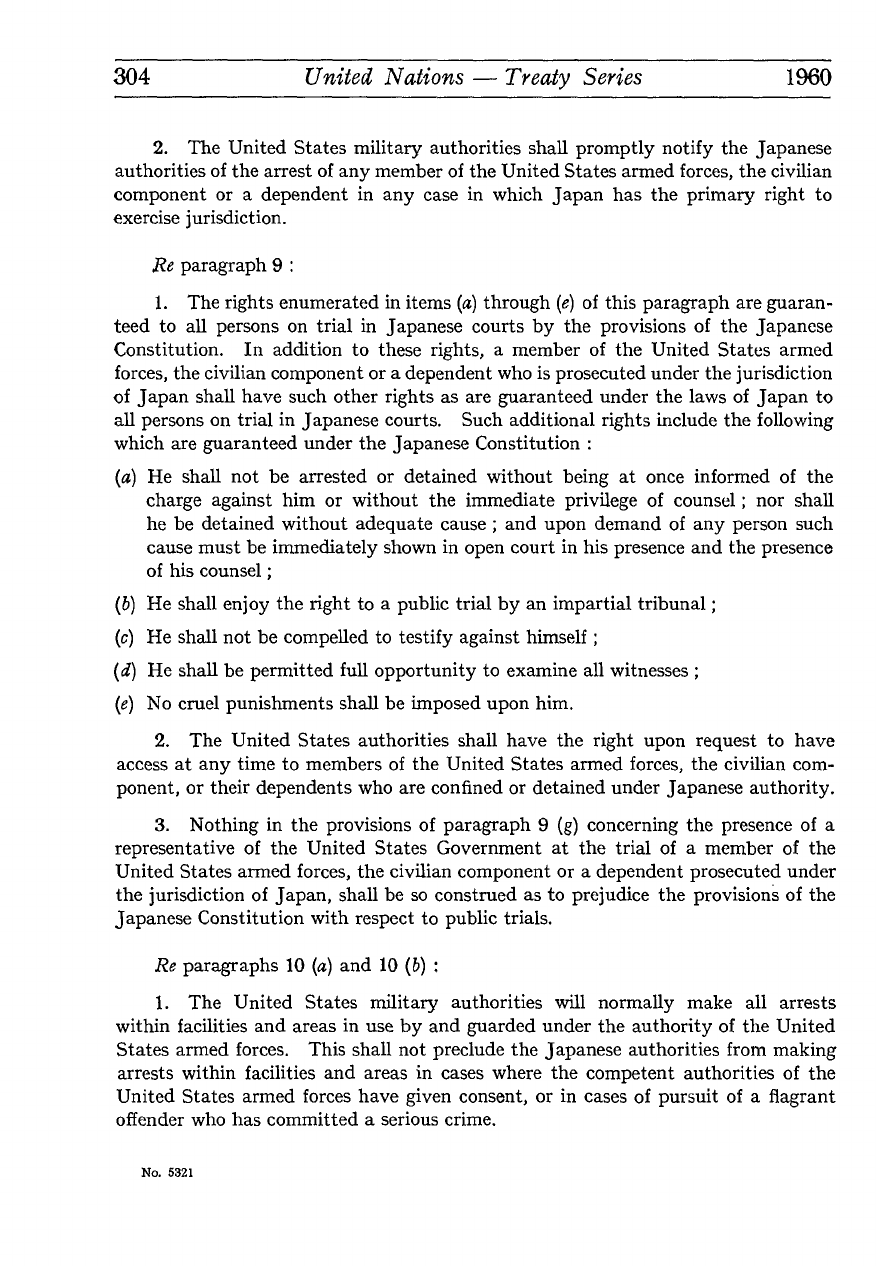
304
United
Nations
Treaty
Series
1960
2.
The
United
States
military
authorities
shall
promptly
notify
the
Japanese
authorities
of
the
arrest
of
any
member
of
the
United
States
armed
forces,
the
civilian
component or
a
dependent
in
any
case
in
which
Japan
has
the
primary
right
to
exercise
jurisdiction.
Re
paragraph
9
:
1.
The
rights
enumerated
in
items
(a.)
through
(e)
of
this
paragraph
are
guaran
teed
to
all
persons
on
trial
in
Japanese
courts
by
the
provisions
of
the
Japanese
Constitution.
In
addition
to
these
rights,
a
member
of
the
United
States
armed
forces,
the
civilian
component
or
a
dependent
who
is
prosecuted
under
the
jurisdiction
of
Japan
shall
have
such
other
rights
as
are
guaranteed
under
the
laws
of
Japan
to
all
persons
on
trial
in
Japanese
courts.
Such
additional
rights
include
the
following
which are
guaranteed
under
the
Japanese
Constitution
:
(a)
He shall
not
be
arrested
or
detained
without
being
at
once
informed
of
the
charge
against
him
or
without
the
immediate
privilege
of
counsel
;
nor
shall
he
be
detained
without
adequate
cause
;
and
upon
demand
of
any
person
such
cause
must
be
immediately
shown
in
open
court
in
his presence
and
the
presence
of
his
counsel
;
(6)
He shall
enjoy
the
right
to
a public
trial
by
an
impartial
tribunal
;
(c)
He
shall
not
be
compelled
to
testify
against
himself
;
(d)
He shall
be
permitted
full
opportunity
to
examine
all
witnesses
;
(e)
No
cruel
punishments
shall
be
imposed
upon
him.
2.
The
United
States
authorities
shall
have
the
right
upon
request
to
have
access
at
any
time
to
members
of
the
United
States
armed
forces,
the
civilian
com
ponent,
or
their
dependents
who
are confined
or
detained
under
Japanese
authority.
3.
Nothing
in
the
provisions
of
paragraph
9
(g)
concerning
the
presence
of
a
representative
of
the
United
States
Government
at
the
trial
of
a
member
of
the
United
States
armed
forces,
the
civilian
component or
a
dependent
prosecuted
under
the
jurisdiction
of
Japan,
shall be
so
construed
as
to
prejudice
the
provisions
of
the
Japanese
Constitution
with
respect
to
public
trials.
Re
paragraphs
10
(a)
and
10
(b)
:
1.
The
United States
military
authorities
will
normally
make
all
arrests
within
facilities
and
areas
in
use
by
and
guarded
under
the
authority
of
the
United
States
armed
forces.
This
shall
not
preclude
the
Japanese
authorities
from
making
arrests
within
facilities
and
areas
in
cases
where
the
competent
authorities
of
the
United States
armed
forces
have
given
consent,
or
in
cases
of
pursuit
of
a
flagrant
offender
who
has
committed
a
serious
crime.
No.
5321
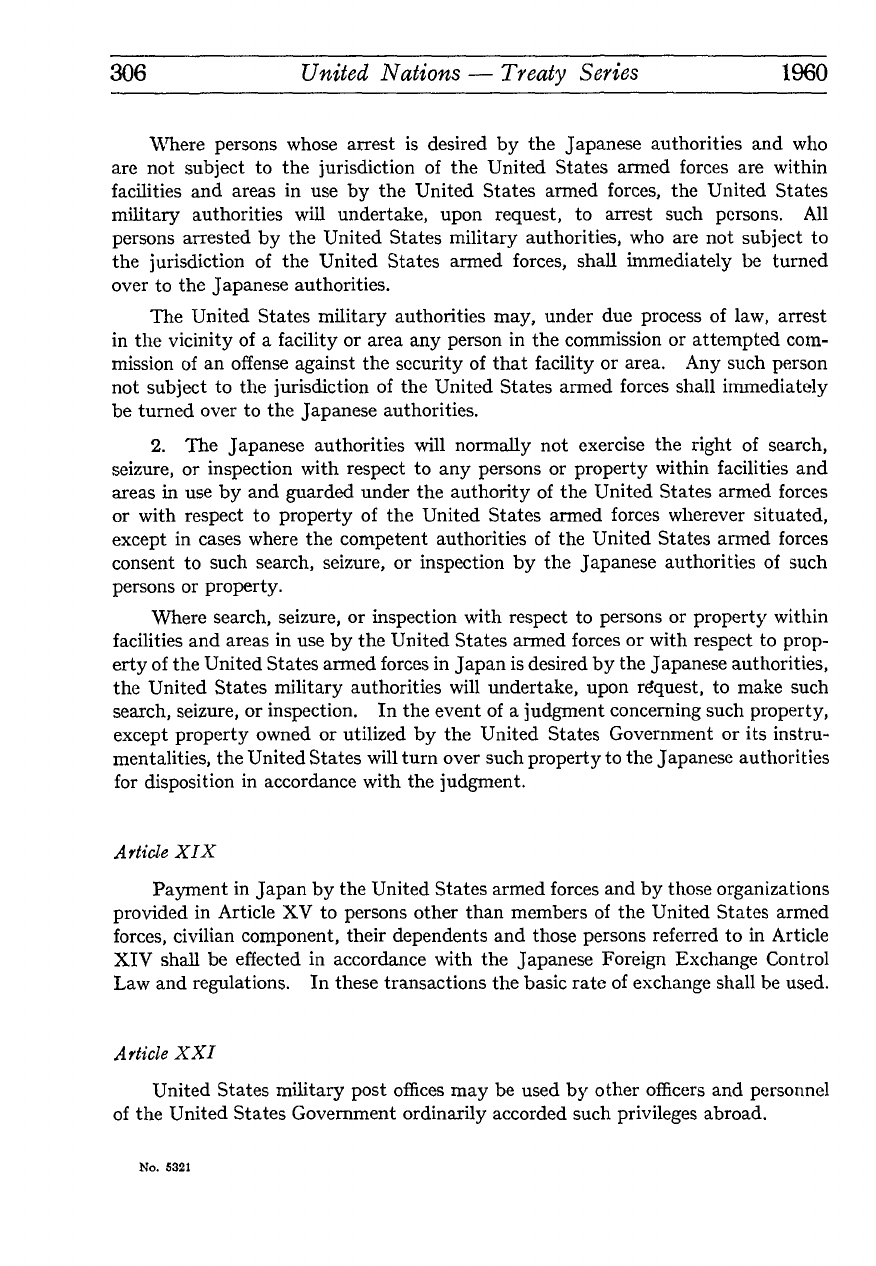
306
United
Nations
Treaty
Series
1960
Where
persons
whose
arrest
is
desired
by
the
Japanese
authorities
and
who
are
not
subject
to
the
jurisdiction
of
the
United
States
armed
forces
are
within
facilities
and
areas
in
use
by
the
United
States
armed
forces,
the
United
States
military
authorities
will
undertake,
upon
request,
to
arrest
such
persons.
All
persons
arrested
by
the
United
States
military
authorities,
who
are
not
subject
to
the
jurisdiction
of
the
United
States
armed
forces,
shall
immediately
be
turned
over
to
the
Japanese
authorities.
The
United
States
military
authorities
may,
under
due
process
of
law,
arrest
in
the
vicinity
of
a
facility
or
area
any
person in
the
commission
or
attempted
com
mission
of
an
offense
against
the
security
of
that
facility
or
area.
Any
such
person
not
subject
to
the
jurisdiction
of
the
United
States
armed
forces
shall
immediately
be
turned
over
to
the
Japanese
authorities.
2.
The
Japanese
authorities
will
normally
not
exercise
the
right
of
search,
seizure,
or
inspection
with
respect
to any
persons
or
property
within
facilities
and
areas
in
use
by
and
guarded
under
the
authority
of
the
United
States
armed
forces
or
with
respect
to
property
of
the
United
States
armed
forces
wherever
situated,
except
in
cases
where
the
competent
authorities
of
the
United
States
armed
forces
consent
to
such
search,
seizure,
or
inspection
by
the
Japanese
authorities
of
such
persons
or
property.
Where
search,
seizure,
or
inspection
with
respect
to
persons
or
property
within
facilities
and
areas
in
use
by
the
United
States
armed
forces
or
with
respect
to
prop
erty
of
the
United
States
armed
forces
in
Japan
is
desired
by
the
Japanese
authorities,
the
United
States
military
authorities
will
undertake,
upon
request,
to
make
such
search,
seizure,
or
inspection.
In
the
event
of
a
judgment
concerning
such
property,
except
property
owned or
utilized
by
the
United
States
Government
or
its
instru
mentalities,
the
United
States
will
turn
over
such
property
to
the Japanese
authorities
for
disposition
in
accordance
with
the
judgment.
Article
XIX
Payment
in
Japan
by the
United
States
armed
forces
and
by
those
organizations
provided
in
Article
XV
to
persons
other
than
members
of
the
United
States
armed
forces,
civilian
component,
their
dependents
and
those
persons
referred
to
in
Article
XIV
shall be
effected
in
accordance
with
the
Japanese
Foreign
Exchange
Control
Law
and
regulations.
In
these
transactions
the
basic
rate
of
exchange shall
be
used.
Article
XXI
United
States
military
post
offices
may
be
used
by
other
officers
and
personnel
of
the
United
States
Government
ordinarily
accorded
such
privileges
abroad.
No.
5321
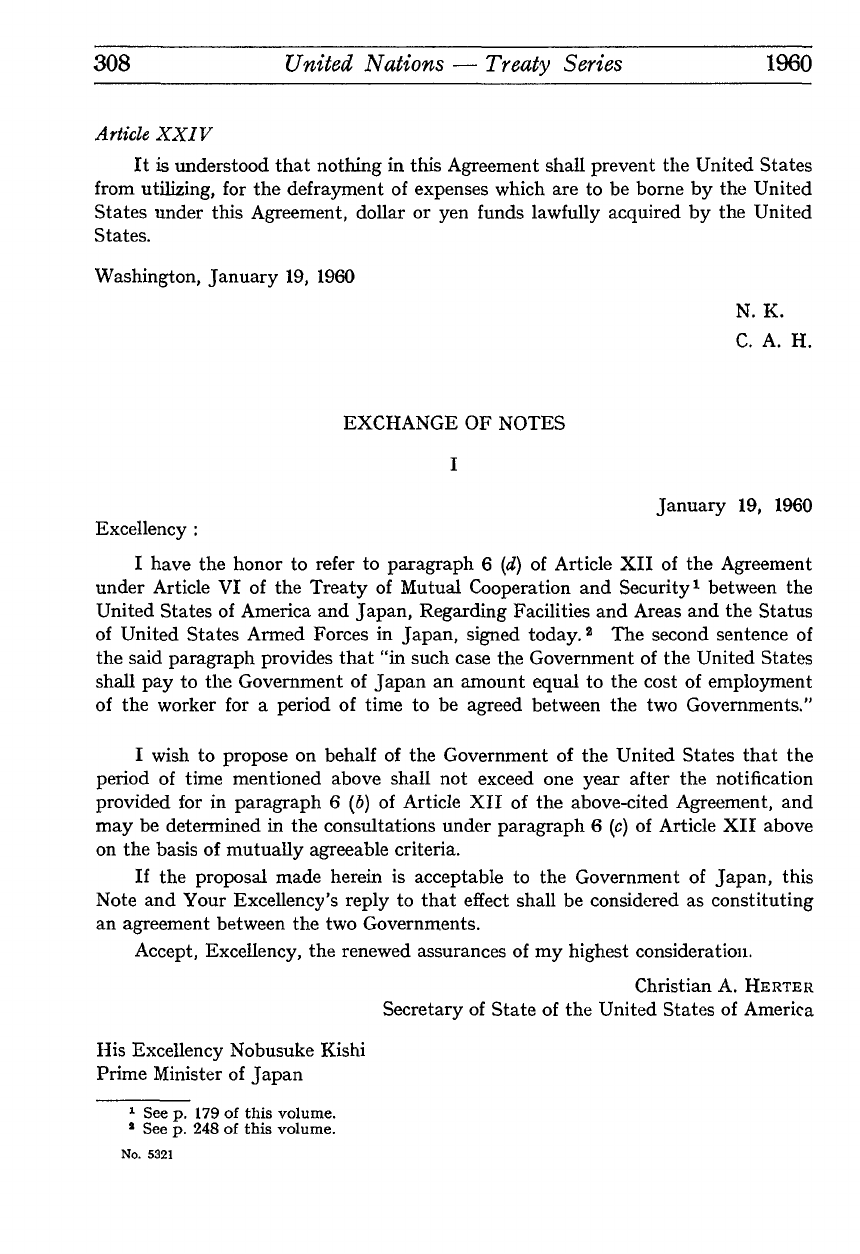
308
United
Nations
Treaty
Series
1960
Article
XXIV
It
is
understood
that
nothing
in
this
Agreement
shall
prevent the
United
States
from
utilizing,
for
the
defrayment
of
expenses which
are
to
be
borne
by
the
United
States
under
this
Agreement,
dollar
or
yen
funds
lawfully
acquired
by the
United
States.
Washington,
January
19,
1960
N.
K.
C.
A.
H.
EXCHANGE
OF
NOTES
January
19,
1960
Excellency
:
I
have
the
honor
to
refer
to
paragraph
6
(d)
of
Article
XII
of
the
Agreement
under
Article
VI
of
the
Treaty
of
Mutual
Cooperation
and
Security
1
between
the
United
States
of
America
and
Japan,
Regarding
Facilities
and
Areas
and
the Status
of
United
States
Armed
Forces
in
Japan,
signed
today.
2
The
second
sentence
of
the
said
paragraph
provides
that
"in
such
case
the
Government
of
the
United
States
shall
pay to
the
Government
of
Japan
an
amount
equal
to the
cost
of
employment
of
the
worker
for
a
period
of
time
to
be
agreed
between
the
two
Governments."
I
wish
to
propose
on
behalf
of
the
Government
of
the
United
States
that
the
period
of
time
mentioned
above
shall
not
exceed
one
year after
the
notification
provided
for
in
paragraph
6
(b)
of
Article
XII
of
the
above-cited
Agreement,
and
may
be
determined
in
the
consultations
under
paragraph
6
(c)
of
Article
XII
above
on
the
basis
of
mutually
agreeable
criteria.
If the
proposal
made
herein
is
acceptable
to
the
Government
of
Japan,
this
Note
and
Your Excellency's
reply
to
that
effect
shall
be
considered
as
constituting
an
agreement
between
the
two
Governments.
Accept,
Excellency,
the
renewed
assurances
of
my
highest
consideration.
Christian
A.
HERTER
Secretary
of
State
of
the
United
States
of
America
His
Excellency
Nobusuke
Kishi
Prime
Minister
of
Japan
1
See
p.
179
of
this
volume.
*
See
p.
248
of
this
volume.
No.
5321
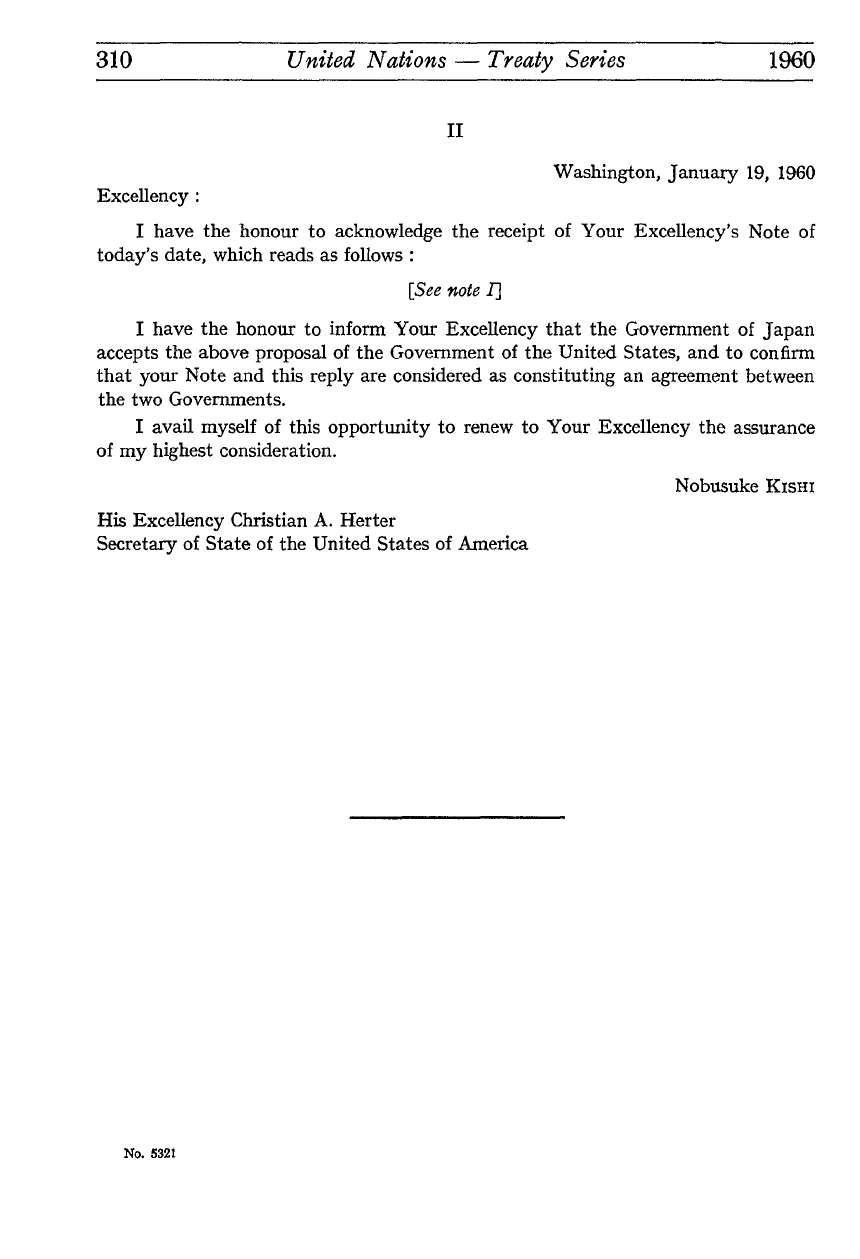
310
United
Nations
—
Treaty
Series
1960
II
Washington,
January
19,
1960
Excellency
:
I
have
the
honour
to
acknowledge
the
receipt
of
Your Excellency's
Note
of
today's
date,
which
reads
as
follows
:
[See
note
I]
I
have
the
honour
to
inform
Your
Excellency
that
the
Government
of
Japan
accepts
the
above
proposal
of
the
Government
of
the
United
States,
and
to
confirm
that
your
Note
and
this
reply
are
considered
as
constituting
an
agreement
between
the
two
Governments.
I
avail
myself
of
this
opportunity
to
renew
to
Your
Excellency
the
assurance
of
my
highest consideration.
Nobusuke
KISHI
His
Excellency
Christian
A.
Herter
Secretary
of
State
of
the
United
States
of
America
No.
5321
